TheSocialGospeland Socialism: A ComparisonoftheThoughtof FrancisGreenwoodPeabody,Washington Gladden,and
WalterRauschenbusch
JACOB H. DORN
For American Protestants who were sensitive to the profound social disruptions associated with rapid industrialization and urbanization in the late nineteenth century, the twin discoveries of the "alienation" of the working class from Protestant churches and of a rising and vibrant socialist movement caused much consternation and anxious soul-searching. Socialism offered not only a radical critique of American political and economic institutions; it also offered the zeal, symbols, and sense of participation in a world-transforming cause often associated with Christianity itself. The religious alienation of the working class and the appeal of socialism were often causally linked in the minds of socially-conscious Protestant leaders.
It is not surprising, therefore, that one of the pioneer historians of the Social Gospel, Charles Howard Hopkins, should call socialism "the midwife and nurse to the social gospel." "Beyond the catalytic effect of liberal theology itself," he wrote, "no single force so stung American Protestantism into social action as did this gadfly of capitalism."' Though none made so bald an assertion as this, the other prominent historians of the pre-World War I Social Gospel-James Dombrowski, Henry F. May, and Robert T. Handy-all gave serious attention to this movement's encounter with socialism.2 Given the importance that these historians attributed to the nexus between Christian social thought and socialism, the subject has received relatively little attention in the last forty years, and it deserves fresh examination.3
1. Charles Howard Hopkins, TheRiseoftheSocialGospelinAmericanProtestantism,1865-1915 (New Haven, 1940),p. 244.
2. James Dombrowski, TheEarlyDaysof ChristianSocialismin America(New York, 1936); Henry F. May, ProtestantChurchesand IndustrialAmerica(New York, 1949; reprint, 1967); Robert T. Handy, "Christianity and Socialism in America, 1900-1920," Church History21 (1952): 39-54.
3. Works that give little or no attention to socialism include Ronald C. White, Jr., and C. Howard Hopkins, TheSocialGospel:Religionand Reformin ChangingAmerica(Philadelphia, 1976), and Donald K.Gorrell, TheAgeofSocialResponsibility:TheSocialGospelin the ProgressiveEra, 1900-1920 (Macon, Ga., 1988). The relationship is central in Richard
Mr. Dorn isprofessorof historyin WrightState University,Dayton, Ohio.
82
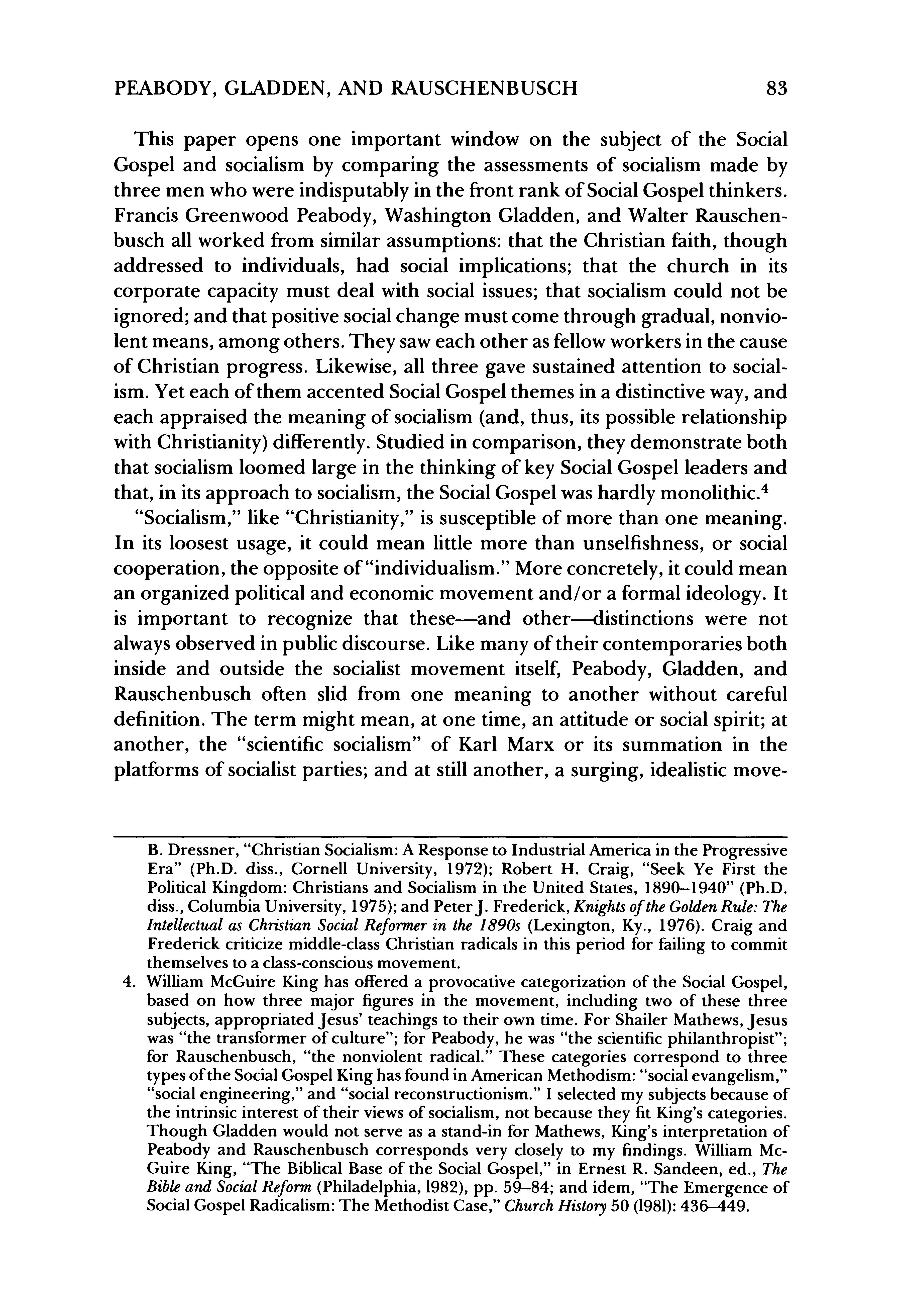 PEABODY, GLADDEN, AND RAUSCHENBUSCH
PEABODY, GLADDEN, AND RAUSCHENBUSCH
This paper opens one important window on the subject of the Social Gospel and socialism by comparing the assessments of socialism made by three men who were indisputablyin the frontrankof SocialGospel thinkers. FrancisGreenwood Peabody, Washington Gladden, and Walter Rauschenbusch all worked from similarassumptions: that the Christianfaith, though addressed to individuals, had social implications; that the church in its corporate capacity must deal with social issues; that socialism could not be ignored; and thatpositive socialchange mustcome through gradual,nonviolent means, among others.They saweachother asfellowworkersinthe cause of Christianprogress. Likewise,all three gave sustained attention to socialism.Yeteach of them accented SocialGospelthemes in adistinctiveway,and each appraised the meaning of socialism(and, thus, its possible relationship withChristianity)differently. Studied in comparison, they demonstrate both that socialismloomed large in the thinking of key SocialGospel leaders and that,in itsapproach to socialism,the SocialGospelwashardlymonolithic.4 "Socialism,"like "Christianity,"is susceptible of more than one meaning. In its loosest usage, it could mean little more than unselfishness, or social cooperation, the opposite of "individualism."Moreconcretely, itcould mean an organized politicaland economic movement and/or a formalideology. It is important to recognize that these-and other-distinctions were not alwaysobserved in publicdiscourse. Likemanyof theircontemporaries both inside and outside the socialist movement itself, Peabody, Gladden, and Rauschenbusch often slid from one meaning to another without careful definition. The term might mean, at one time, an attitude or social spirit;at another, the "scientific socialism" of Karl Marx or its summation in the platforms of socialistparties;and at stillanother, a surging, idealistic move-
B.Dressner,"ChristianSocialism:AResponseto IndustrialAmericaintheProgressive Era"(Ph.D. diss., Cornell University,1972); RobertH. Craig, "SeekYe Firstthe PoliticalKingdom:Christiansand Socialismin the UnitedStates,1890-1940"(Ph.D. diss.,ColumbiaUniversity,1975);andPeterJ. Frederick,KnightsoftheGoldenRule:The Intellectualas ChristianSocialReformerin the1890s(Lexington,Ky., 1976).Craigand Frederickcriticizemiddle-classChristianradicalsin thisperiodforfailingto commit themselvestoaclass-consciousmovement.
4. WilliamMcGuireKinghasoffereda provocativecategorizationof the SocialGospel, based on how three majorfiguresin the movement,includingtwo of these three subjects,appropriatedJesus'teachingsto theirowntime.ForShailerMathews,Jesus was"thetransformerof culture";forPeabody,he was"thescientificphilanthropist"; for Rauschenbusch,"thenonviolentradical."These categoriescorrespondto three typesoftheSocialGospelKinghasfoundinAmericanMethodism:"socialevangelism," "socialengineering,"and"socialreconstructionism." I selectedmysubjectsbecauseof the intrinsicinterestof theirviewsof socialism,notbecausetheyfitKing'scategories. Though Gladdenwouldnot serveasa stand-inforMathews,King'sinterpretationof Peabodyand Rauschenbuschcorrespondsverycloselyto my findings.WilliamMcGuireKing,"TheBiblicalBaseof the SocialGospel,"in ErnestR. Sandeen,ed., The BibleandSocialReform(Philadelphia,1982),pp. 59-84; andidem,"TheEmergenceof SocialGospelRadicalism:TheMethodistCase,"ChurchHistory50(1981):436-449.
83
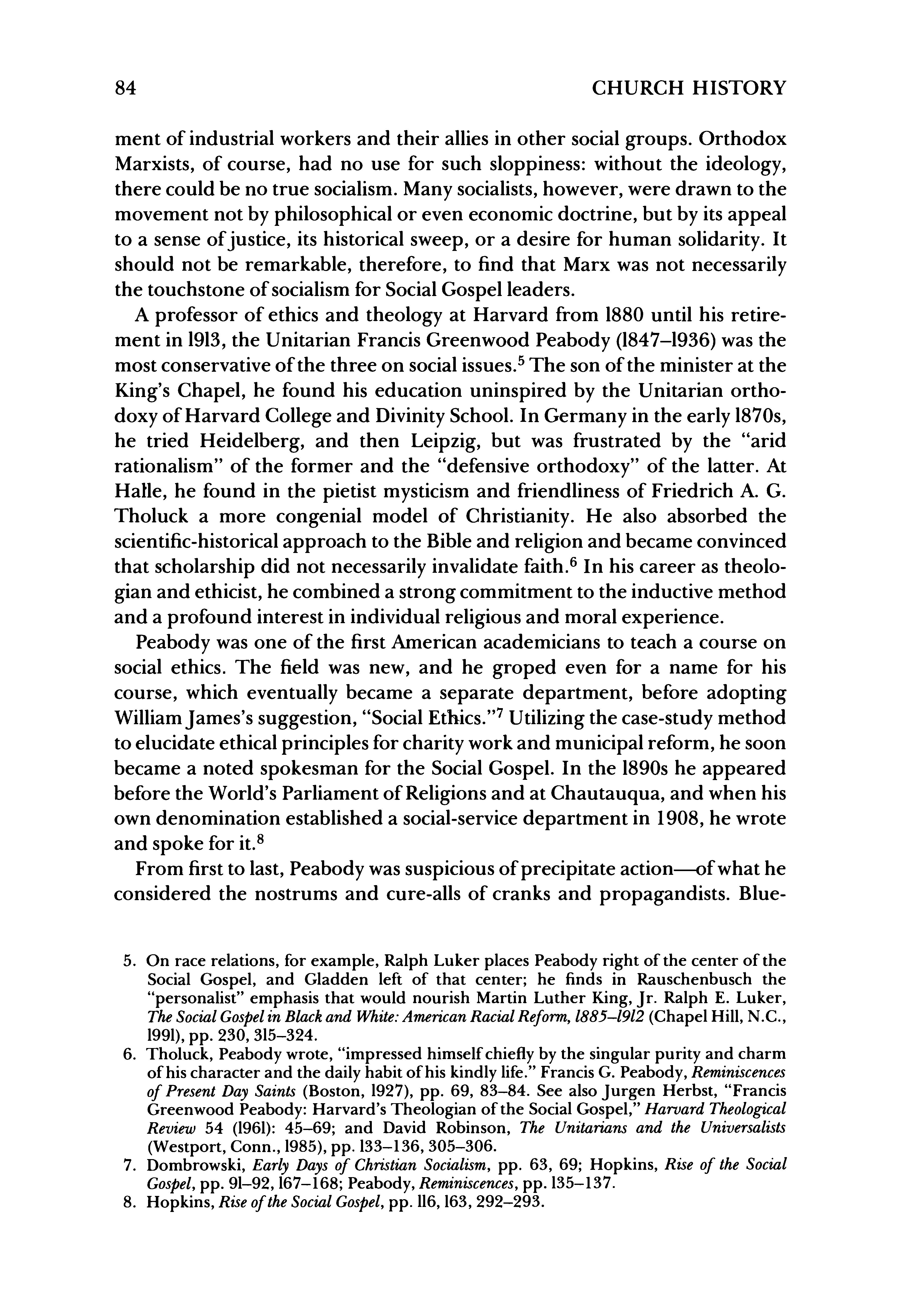
CHURCH HISTORY
ment of industrialworkersand their alliesin other socialgroups. Orthodox Marxists,of course, had no use for such sloppiness: without the ideology, there could be no true socialism.Manysocialists,however, were drawnto the movement not byphilosophical or even economic doctrine, but byitsappeal to a sense ofjustice, its historicalsweep, or a desire for human solidarity. It should not be remarkable,therefore, to find that Marxwas not necessarily the touchstone of socialismfor SocialGospelleaders.
A professor of ethics and theology at Harvard from 1880until his retirement in 1913,the Unitarian FrancisGreenwood Peabody(1847-1936)wasthe mostconservativeof the three on socialissues.5The son of the ministeratthe King'sChapel, he found his education uninspired by the Unitarian orthodoxy of HarvardCollege and DivinitySchool. In Germanyin the early1870s, he tried Heidelberg, and then Leipzig, but was frustrated by the "arid rationalism"of the former and the "defensive orthodoxy" of the latter. At Halle, he found in the pietist mysticismand friendliness of FriedrichA. G. Tholuck a more congenial model of Christianity. He also absorbed the scientific-historicalapproach to the Bibleand religion andbecameconvinced that scholarshipdid not necessarilyinvalidatefaith.6In his career as theologianand ethicist,he combined astrongcommitment to the inductive method and a profound interestin individual religious and moralexperience.
Peabodywas one of the firstAmerican academicians to teach a course on social ethics. The field was new, and he groped even for a name for his course, which eventually became a separate department, before adopting WilliamJames'ssuggestion, "SocialEthics."7Utilizingthe case-studymethod toelucidateethicalprinciplesforcharityworkand municipalreform,he soon became a noted spokesman for the SocialGospel. In the 1890she appeared before the World'sParliamentof Religionsand atChautauqua,and when his own denomination establisheda social-servicedepartment in 1908, he wrote and spoke forit.8
Fromfirsttolast,Peabodywassuspiciousof precipitateaction-of whathe considered the nostrums and cure-alls of cranks and propagandists. Blue-
5. On race relations, for example, Ralph Luker places Peabody right of the center of the Social Gospel, and Gladden left of that center; he finds in Rauschenbusch the "personalist" emphasis that would nourish Martin Luther King, Jr. Ralph E. Luker, TheSocialGospelin Blackand White:AmericanRacialReform,1885-1912(Chapel Hill, N.C., 1991),pp. 230, 315-324.
6. Tholuck, Peabody wrote, "impressed himself chiefly by the singular purity and charm of his character and the daily habit of his kindly life." Francis G. Peabody, Reminiscences of PresentDay Saints (Boston, 1927), pp. 69, 83-84. See also Jurgen Herbst, "Francis Greenwood Peabody: Harvard's Theologian of the Social Gospel," HarvardTheological Review 54 (1961):45-69; and David Robinson, The Unitarians and the Universalists (Westport, Conn., 1985),pp. 133-136, 305-306.
7. Dombrowski, Early Days of ChristianSocialism,pp. 63, 69; Hopkins, Rise of the Social Gospel,pp. 91-92,167-168; Peabody, Reminiscences,pp. 135-137.
8. Hopkins, RiseoftheSocialGospel,pp. 116,163,292-293.
84
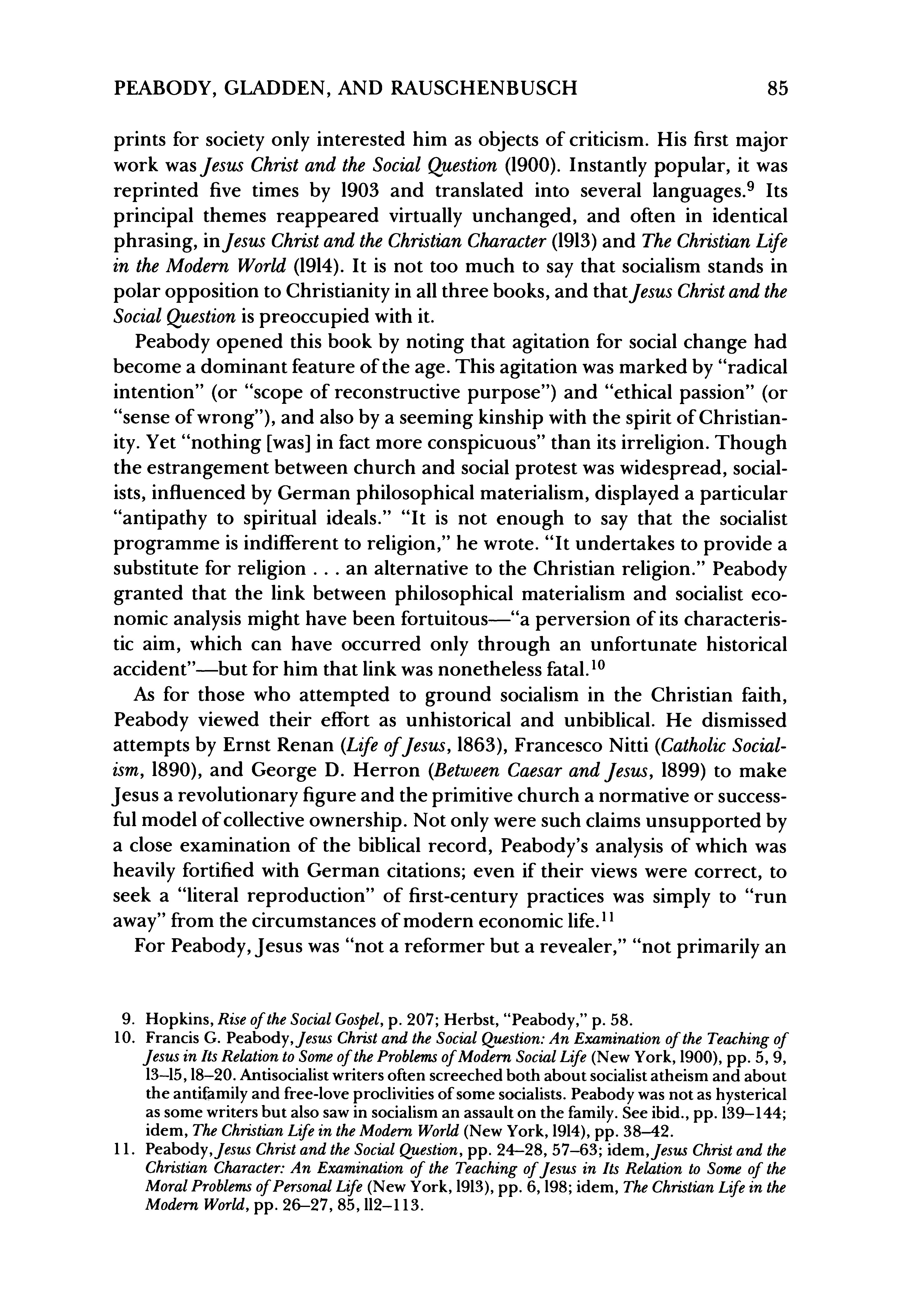
prints for society only interested him as objects of criticism. His first major work wasJesusChristandtheSocialQuestion(1900).Instantly popular, it was reprinted five times by 1903 and translated into several languages.9 Its principal themes reappeared virtually unchanged, and often in identical phrasing, inJesusChristandtheChristianCharacter(1913)and TheChristianLife in theModernWorld(1914).It is not too much to say that socialism stands in polaropposition to Christianityin allthree books, and thatJesusChristandthe SocialQuestionispreoccupied withit.
Peabody opened this book by noting that agitation for social change had become adominant featureof the age. This agitationwasmarkedby"radical intention" (or "scope of reconstructive purpose") and "ethicalpassion" (or "senseof wrong"),and alsoby a seeming kinship withthe spiritof Christianity.Yet "nothing [was]in factmore conspicuous"than itsirreligion. Though the estrangement between church and socialprotest waswidespread, socialists,influenced by German philosophical materialism,displayed a particular "antipathy to spiritual ideals." "It is not enough to say that the socialist programme is indifferent to religion," he wrote. "Itundertakes to provide a substitute for religion ... an alternative to the Christianreligion." Peabody granted that the link between philosophical materialism and socialist economic analysismight have been fortuitous-"a perversion of its characteristic aim, which can have occurred only through an unfortunate historical accident"-but for him thatlinkwasnonetheless fatal.10
As for those who attempted to ground socialism in the Christian faith, Peabody viewed their effort as unhistorical and unbiblical. He dismissed attempts by ErnstRenan (LifeofJesus,1863),FrancescoNitti (CatholicSocialism,1890),and George D. Herron (BetweenCaesarandJesus, 1899)to make Jesus arevolutionaryfigure and the primitivechurch anormativeor successful model ofcollectiveownership. Not only were such claimsunsupported by a close examination of the biblicalrecord, Peabody's analysis of which was heavily fortified with German citations;even if their views were correct, to seek a "literal reproduction" of first-century practices was simply to "run away"from the circumstancesof modern economic life.'1
ForPeabody,Jesus was"nota reformer but a revealer,""notprimarilyan
9. Hopkins, RiseoftheSocialGospel,p. 207; Herbst, "Peabody," p. 58.
10. Francis G. Peabody,Jesus Christand theSocialQuestion:An Examinationof theTeachingof Jesusin ItsRelationtoSomeoftheProblemsofModernSocialLife(New York, 1900), pp. 5, 9, 13-15,18-20. Antisocialist writers often screeched both about socialist atheism and about the antifamily and free-love proclivities of some socialists. Peabody was not as hysterical as some writers but also sawin socialism an assault on the family. See ibid., pp. 139-144; idem, TheChristianLifein theModernWorld(New York, 1914),pp. 38-42.
11. Peabody,Jesus Christand theSocialQuestion,pp. 24-28, 57-63; idem,Jesus Christand the ChristianCharacter:An Examinationof the TeachingofJesus in Its Relationto Someof the MoralProblemsofPersonalLife(New York, 1913),pp. 6,198; idem, TheChristianLifein the ModernWorld,pp. 26-27, 85,112-113.
PEABODY,GLADDEN,AND RAUSCHENBUSCH
85
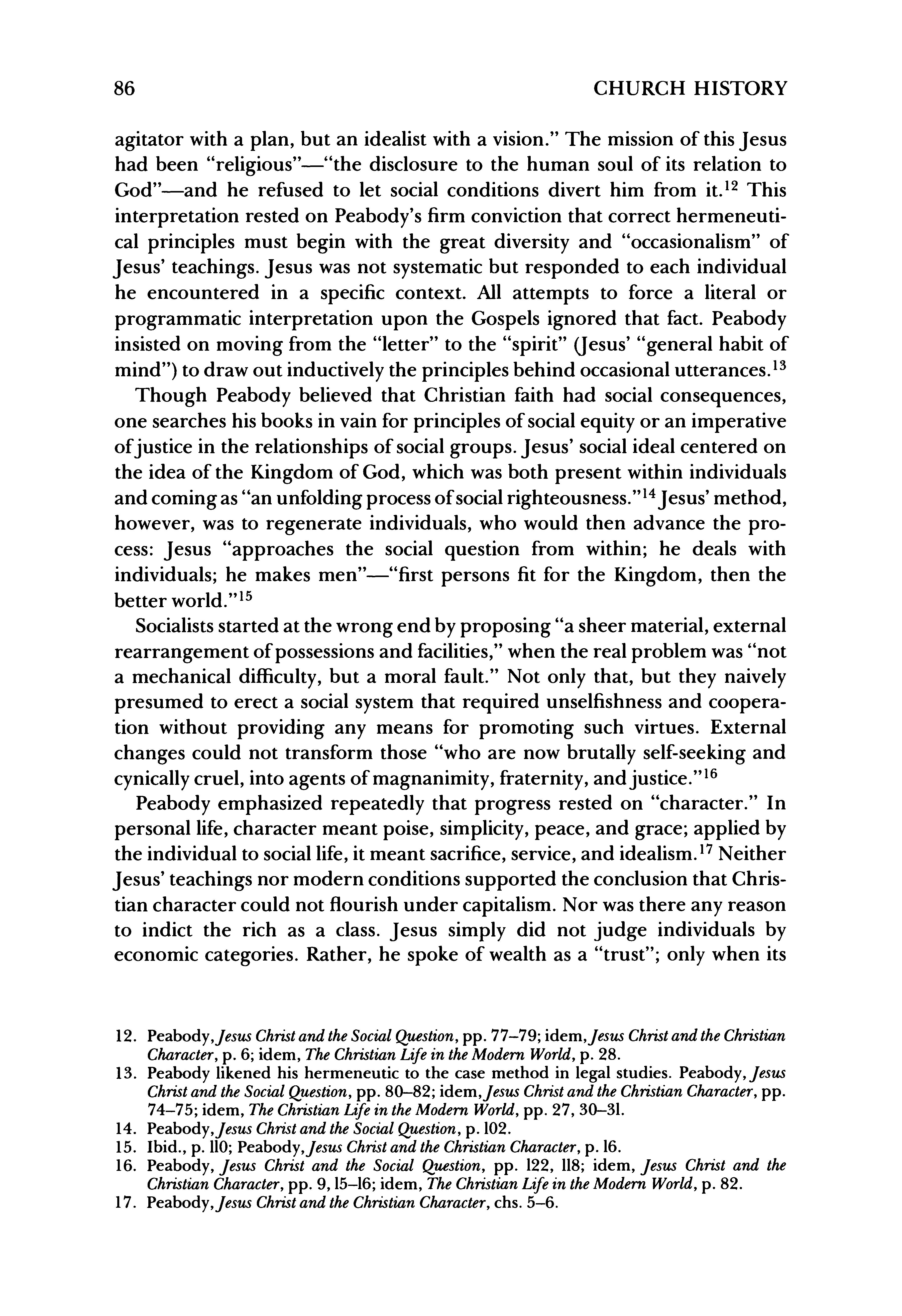
CHURCH HISTORY
agitatorwith a plan, but an idealist with a vision."The mission of thisJesus had been "religious"-"the disclosure to the human soul of its relation to God"-and he refused to let social conditions divert him from it.12This interpretation rested on Peabody'sfirmconviction thatcorrect hermeneutical principles must begin with the great diversity and "occasionalism"of Jesus' teachings.Jesus was not systematicbut responded to each individual he encountered in a specific context. All attempts to force a literal or programmatic interpretation upon the Gospels ignored that fact. Peabody insisted on moving from the "letter"to the "spirit"(Jesus'"general habitof mind")todrawout inductivelythe principlesbehind occasionalutterances.13
Though Peabody believed that Christian faith had social consequences, one searcheshisbooks in vainfor principlesof socialequityor an imperative ofjustice in the relationshipsof socialgroups.Jesus' socialideal centered on the idea of the Kingdom of God, which wasboth present within individuals andcomingas"anunfolding processofsocialrighteousness."14Jesus'method, however, was to regenerate individuals, who would then advance the process: Jesus "approaches the social question from within; he deals with individuals; he makes men"-"first persons fit for the Kingdom, then the betterworld."15
Socialistsstartedatthewrong end byproposing "asheer material,external rearrangement of possessions and facilities,"when the realproblem was"not a mechanical difficulty,but a moral fault." Not only that, but they naively presumed to erect a social system that required unselfishness and cooperation without providing any means for promoting such virtues. External changes could not transform those "who are now brutally self-seeking and cynicallycruel, into agents of magnanimity,fraternity,andjustice."16
Peabody emphasized repeatedly that progress rested on "character."In personal life, charactermeant poise, simplicity,peace, and grace;applied by the individual to sociallife,itmeant sacrifice,service,and idealism.17Neither Jesus'teachings nor modern conditions supported the conclusion thatChristiancharactercould not flourish under capitalism.Nor wasthere any reason to indict the rich as a class. Jesus simply did not judge individuals by economic categories. Rather, he spoke of wealth as a "trust";only when its
12. Peabody,Jesus ChristandtheSocialQuestion,pp. 77-79; idem,Jesus ChristandtheChristian Character,p. 6; idem, TheChristianLifein theModernWorld,p. 28.
13. Peabody likened his hermeneutic to the case method in legal studies. Peabody, Jesus ChristandtheSocialQuestion,pp. 80-82; idem,Jesus ChristandtheChristianCharacter,pp. 74-75; idem, TheChristianLifein theModernWorld,pp. 27, 30-31.
14. Peabody,Jesus ChristandtheSocialQuestion,p. 102.
15. Ibid., p. 110;Peabody,Jesus Christand theChristianCharacter,p. 16.
16. Peabody, Jesus Christand the Social Question, pp. 122, 118;idem, Jesus Christand the ChristianCharacter,pp. 9,15-16; idem, TheChristianLifein theModernWorld,p. 82.
17. Peabody,Jesus ChristandtheChristianCharacter,chs. 5-6.
86
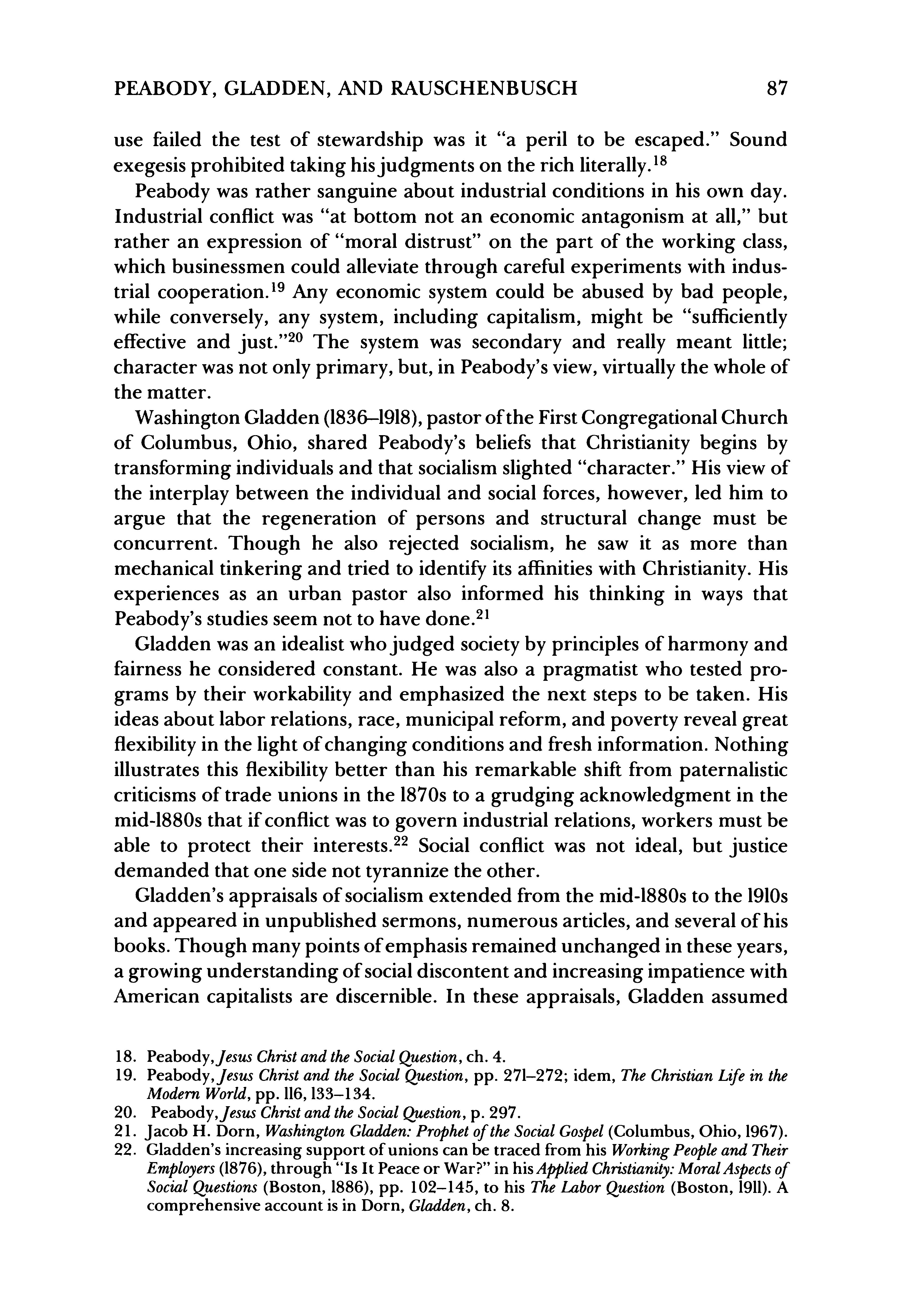
use failed the test of stewardship was it "a peril to be escaped." Sound exegesis prohibited takinghisjudgments on the richliterally.18
Peabody was rather sanguine about industrial conditions in his own day. Industrial conflict was "atbottom not an economic antagonism at all,"but rather an expression of "moral distrust"on the part of the working class, which businessmen could alleviatethrough careful experiments with industrial cooperation.19Any economic system could be abused by bad people, while conversely, any system, including capitalism, might be "sufficiently effective and just."20The system was secondary and really meant little; characterwasnot only primary,but, in Peabody'sview,virtuallythe whole of the matter.
WashingtonGladden(1836-1918),pastorofthe FirstCongregationalChurch of Columbus, Ohio, shared Peabody's beliefs that Christianity begins by transformingindividualsand that socialismslighted "character."His view of the interplay between the individual and social forces, however, led him to argue that the regeneration of persons and structural change must be concurrent. Though he also rejected socialism, he saw it as more than mechanical tinkering and tried to identify its affinitieswith Christianity.His experiences as an urban pastor also informed his thinking in ways that Peabody'sstudies seem not to have done.21
Gladden wasan idealistwhojudged societyby principles of harmony and fairness he considered constant. He was also a pragmatist who tested programs by their workabilityand emphasized the next steps to be taken. His ideas about laborrelations, race, municipalreform, and poverty revealgreat flexibilityin the light of changing conditions and freshinformation. Nothing illustrates this flexibilitybetter than his remarkable shift from paternalistic criticismsof trade unions in the 1870sto a grudging acknowledgment in the mid-1880sthat ifconflict wasto govern industrialrelations, workers must be able to protect their interests.22Social conflict was not ideal, but justice demanded thatone side not tyrannizethe other.
Gladden'sappraisalsof socialismextended from the mid-1880sto the 1910s and appeared in unpublished sermons, numerous articles,and severalof his books.Though manypointsofemphasisremained unchanged in these years, agrowing understanding of socialdiscontent and increasingimpatience with American capitalistsare discernible. In these appraisals, Gladden assumed
18. Peabody,Jesus ChristandtheSocialQuestion,ch. 4.
19. Peabody,Jesus Christand theSocialQuestion,pp. 271-272; idem, TheChristianLifein the ModernWorld,pp. 116,133-134.
20. Peabody,Jesus ChristandtheSocialQuestion,p. 297.
21. Jacob H. Dorn, WashingtonGladden:ProphetoftheSocialGospel(Columbus, Ohio, 1967).
22. Gladden's increasing support of unions can be traced from his WorkingPeopleand Their Employers(1876),through "Is It Peace or War?"in hisAppliedChristianity:MoralAspectsof Social Questions(Boston, 1886), pp. 102-145, to his TheLaborQuestion(Boston, 1911).A comprehensive account is in Dorn, Gladden,ch. 8.
PEABODY,GLADDEN,AND RAUSCHENBUSCH
87
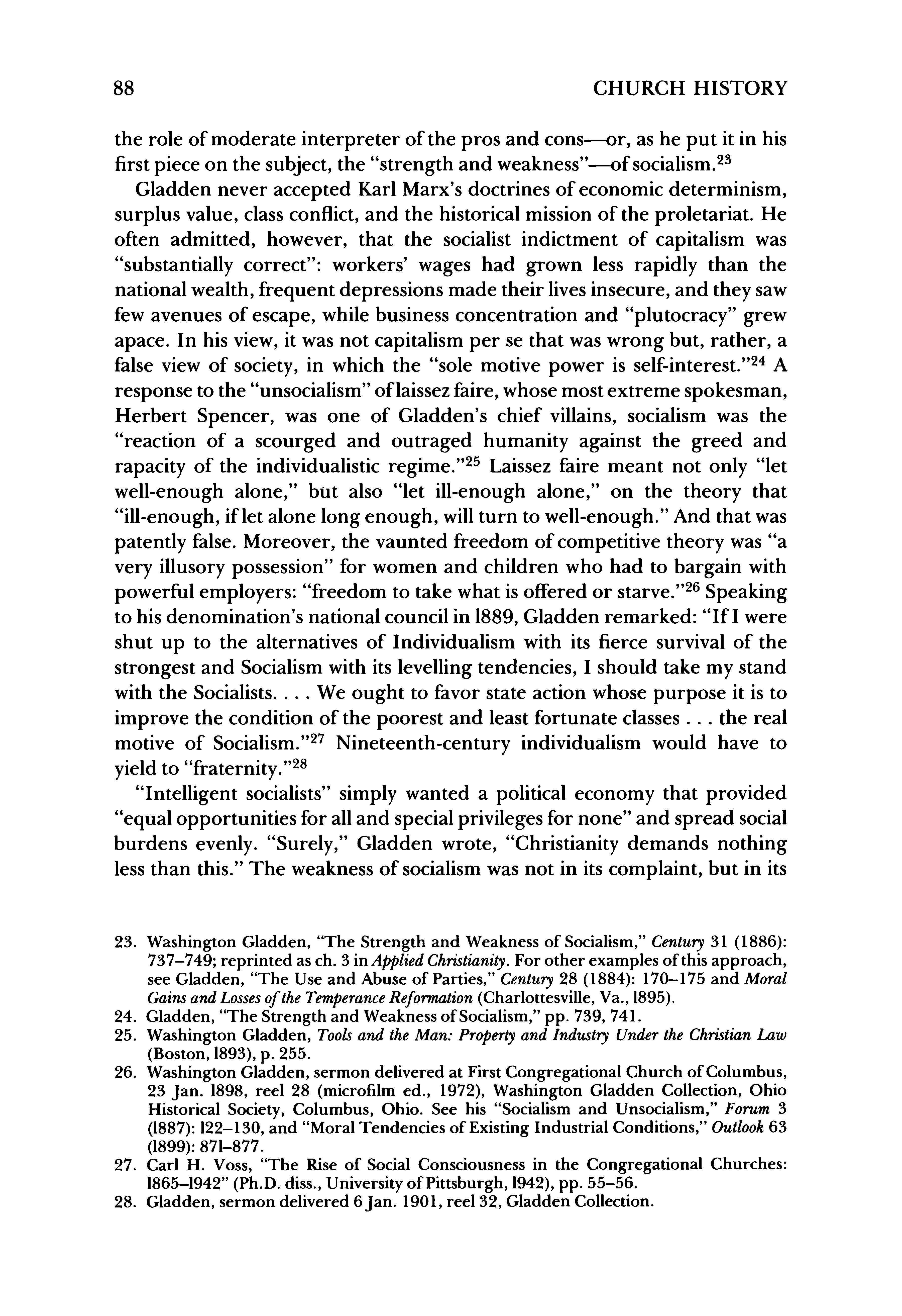
CHURCH HISTORY
the role of moderate interpreter of the pros and cons-or, as he put it in his firstpiece on the subject,the "strengthand weakness"-of socialism.23
Gladden never accepted KarlMarx'sdoctrines of economic determinism, surplus value, classconflict, and the historicalmission of the proletariat. He often admitted, however, that the socialist indictment of capitalism was "substantiallycorrect": workers' wages had grown less rapidly than the nationalwealth,frequentdepressions made theirlivesinsecure, and theysaw few avenues of escape, while business concentration and "plutocracy"grew apace. In his view, it was not capitalismper se that waswrong but, rather, a false view of society, in which the "sole motive power is self-interest."24A response tothe "unsocialism"oflaissezfaire,whose mostextreme spokesman, Herbert Spencer, was one of Gladden's chief villains, socialism was the "reaction of a scourged and outraged humanity against the greed and rapacity of the individualistic regime."25Laissez faire meant not only "let well-enough alone," but also "let ill-enough alone," on the theory that "ill-enough,iflet alone long enough, willturn to well-enough."And thatwas patently false. Moreover, the vaunted freedom of competitive theory was "a very illusory possession" for women and children who had to bargain with powerful employers: "freedomto takewhatis offered or starve."26Speaking to hisdenomination's nationalcouncil in 1889,Gladden remarked:"IfI were shut up to the alternatives of Individualism with its fierce survival of the strongest and Socialismwith its levelling tendencies, I should take my stand with the Socialists.... We ought to favor state action whose purpose it is to improve the condition of the poorest and least fortunate classes . . . the real motive of Socialism."27Nineteenth-century individualism would have to yield to "fraternity."28
"Intelligent socialists"simply wanted a political economy that provided "equalopportunities foralland specialprivilegesfornone"and spreadsocial burdens evenly. "Surely,"Gladden wrote, "Christianitydemands nothing less than this."The weakness of socialismwas not in its complaint, but in its
23. Washington Gladden, "The Strength and Weakness of Socialism," Century31 (1886): 737-749; reprinted as ch. 3 inAppliedChristianity.For other examples of this approach, see Gladden, "The Use and Abuse of Parties," Century28 (1884): 170-175 and Moral GainsandLossesoftheTemperanceReformation(Charlottesville, Va., 1895).
24. Gladden, "The Strength and Weakness of Socialism," pp. 739, 741.
25. Washington Gladden, Toolsand theMan: Propertyand IndustryUnderthe ChristianLaw (Boston, 1893),p. 255.
26. Washington Gladden, sermon delivered at First Congregational Church of Columbus, 23 Jan. 1898, reel 28 (microfilm ed., 1972), Washington Gladden Collection, Ohio Historical Society, Columbus, Ohio. See his "Socialism and Unsocialism," Forum 3 (1887):122-130, and "MoralTendencies of Existing Industrial Conditions," Outlook63 (1899):871-877.
27. Carl H. Voss, "The Rise of Social Consciousness in the Congregational Churches: 1865-1942" (Ph.D. diss., University of Pittsburgh, 1942),pp. 55-56.
28. Gladden, sermon delivered 6Jan. 1901, reel 32, Gladden Collection.
88
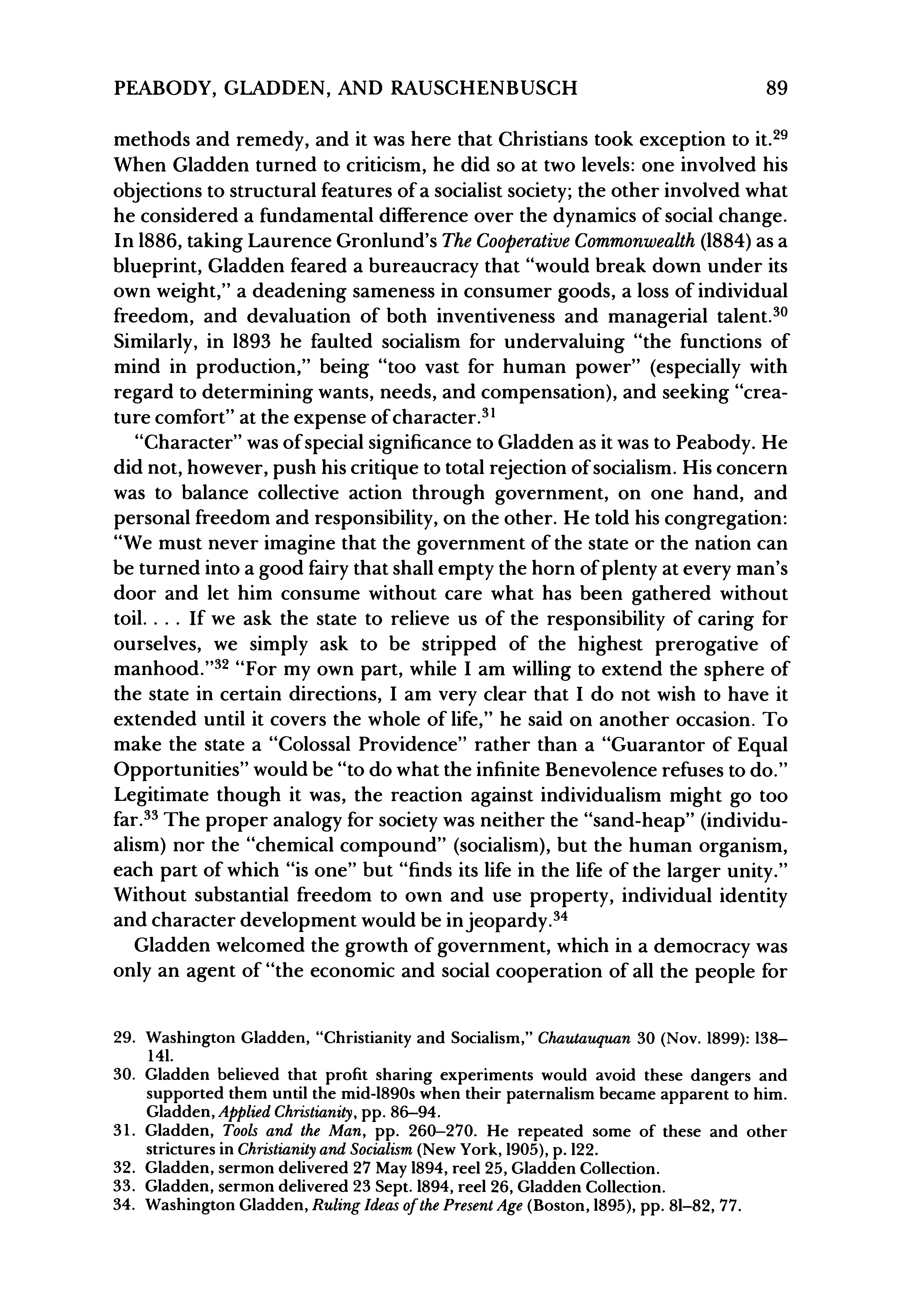
methods and remedy, and it was here that Christianstook exception to it.29 When Gladden turned to criticism,he did so at two levels: one involved his objectionsto structuralfeatures of a socialistsociety;the other involved what he considered a fundamental difference over the dynamicsof socialchange. In 1886,takingLaurenceGronlund'sTheCooperativeCommonwealth(1884)asa blueprint, Gladden feared a bureaucracythat "wouldbreak down under its own weight,"a deadening sameness in consumer goods, a loss of individual freedom, and devaluation of both inventiveness and managerial talent.30 Similarly, in 1893 he faulted socialism for undervaluing "the functions of mind in production," being "too vast for human power" (especially with regard to determining wants, needs, and compensation), and seeking "creature comfort"atthe expense ofcharacter.31
"Character"wasof specialsignificancetoGladden asitwasto Peabody.He did not, however, push hiscritiqueto totalrejectionof socialism.Hisconcern was to balance collective action through government, on one hand, and personal freedom and responsibility,on the other. He told his congregation: "Wemust never imagine that the government of the state or the nation can be turned into agood fairythatshallempty the horn of plenty atevery man's door and let him consume without care what has been gathered without toil.... If we ask the state to relieve us of the responsibility of caring for ourselves, we simply ask to be stripped of the highest prerogative of manhood."32"Formy own part, while I am willing to extend the sphere of the state in certain directions, I am very clear that I do not wish to have it extended until it covers the whole of life," he said on another occasion. To make the state a "ColossalProvidence" rather than a "Guarantorof Equal Opportunities"would be "todo whatthe infinite Benevolence refuses todo."
Legitimate though it was, the reaction against individualism might go too far.33The proper analogy for societywasneither the "sand-heap"(individualism) nor the "chemicalcompound" (socialism),but the human organism, each part of which "isone" but "findsits life in the life of the larger unity." Without substantial freedom to own and use property, individual identity and characterdevelopment would be injeopardy.34
Gladden welcomed the growth of government, which in a democracy was only an agent of "the economic and social cooperation of all the people for
29. Washington Gladden, "Christianity and Socialism," Chautauquan30 (Nov. 1899): 138141.
30. Gladden believed that profit sharing experiments would avoid these dangers and supported them until the mid-1890s when their paternalism became apparent to him. Gladden, AppliedChristianity,pp. 86-94.
31. Gladden, Tools and the Man, pp. 260-270. He repeated some of these and other strictures in Christianityand Socialism(New York, 1905),p. 122.
32. Gladden, sermon delivered 27 May1894,reel 25, Gladden Collection.
33. Gladden, sermon delivered 23 Sept. 1894, reel 26, Gladden Collection.
34. Washington Gladden, Ruling IdeasofthePresentAge (Boston, 1895), pp. 81-82, 77.
PEABODY,GLADDEN,AND RAUSCHENBUSCH
89
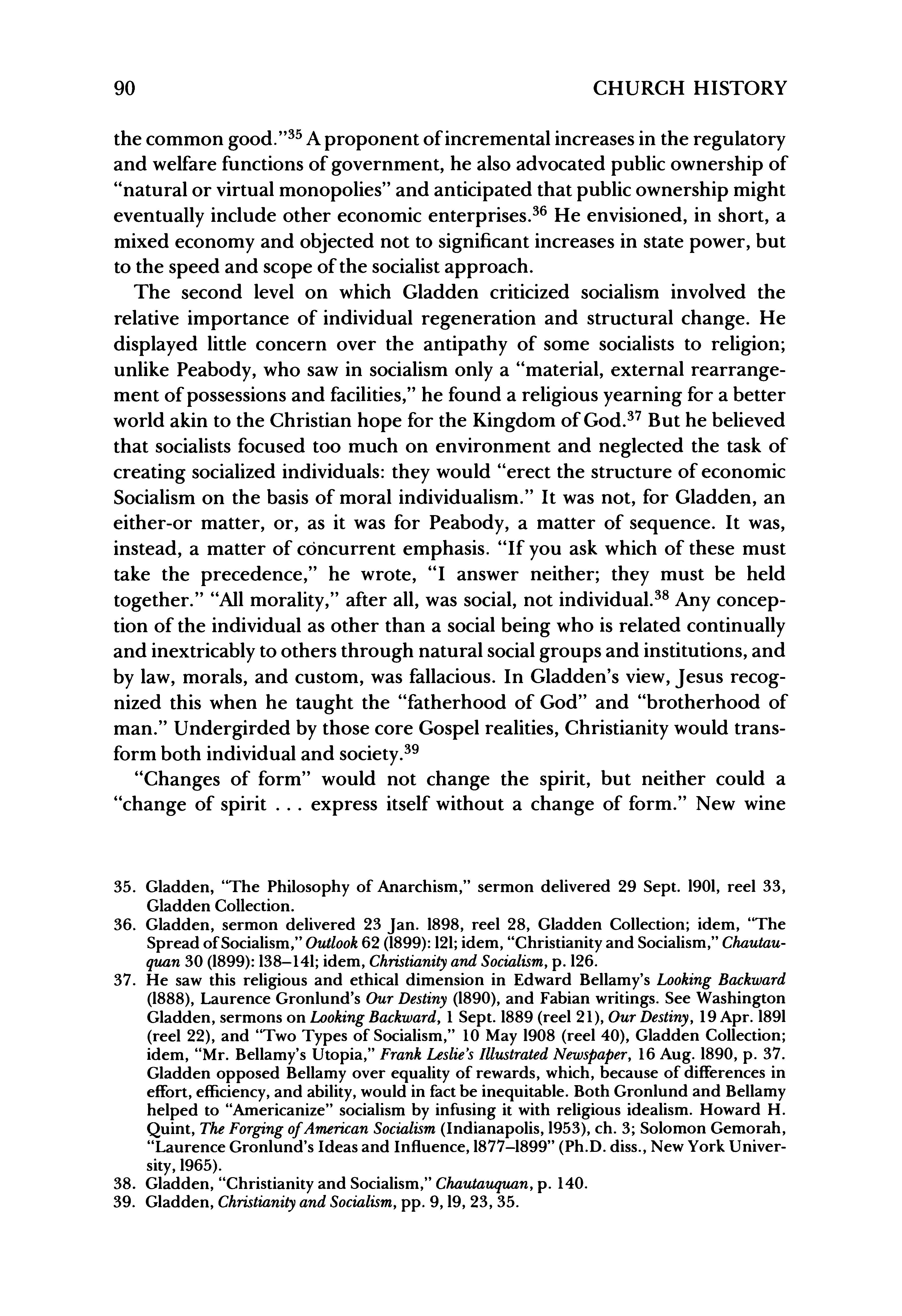
the common good."35Aproponent ofincrementalincreasesin the regulatory and welfarefunctions of government, he also advocated publicownership of "naturalor virtualmonopolies"and anticipatedthatpublicownership might eventually include other economic enterprises.36He envisioned, in short, a mixed economy and objected not to significantincreases in statepower, but to the speed and scope of the socialistapproach.
The second level on which Gladden criticized socialism involved the relative importance of individual regeneration and structural change. He displayed little concern over the antipathy of some socialists to religion; unlike Peabody, who saw in socialismonly a "material,external rearrangement of possessions and facilities,"he found a religious yearning for abetter world akinto the Christianhope for the Kingdom of God.37But he believed that socialistsfocused too much on environment and neglected the task of creating socialized individuals:they would "erectthe structure of economic Socialismon the basis of moral individualism." It was not, for Gladden, an either-or matter, or, as it was for Peabody, a matter of sequence. It was, instead, a matter of concurrent emphasis. "If you ask which of these must take the precedence," he wrote, "I answer neither; they must be held together." "Allmorality,"after all, was social, not individual.38Any conception of the individual as other than a socialbeing who is related continually and inextricablytoothers through naturalsocialgroups and institutions,and by law, morals, and custom, was fallacious. In Gladden's view,Jesus recognized this when he taught the "fatherhood of God" and "brotherhood of man."Undergirded by those core Gospel realities,Christianitywould transformboth individualand society.39
"Changes of form" would not change the spirit, but neither could a "change of spirit ... express itself without a change of form." New wine
35. Gladden, "The Philosophy of Anarchism," sermon delivered 29 Sept. 1901,reel 33, Gladden Collection.
36. Gladden, sermon delivered 23 Jan. 1898, reel 28, Gladden Collection; idem, "The Spread of Socialism," Outlook62 (1899):121;idem, "Christianityand Socialism," Chautauquan30 (1899):138-141;idem, Christianityand Socialism,p. 126.
37. He saw this religious and ethical dimension in Edward Bellamy's LookingBackward (1888), Laurence Gronlund's OurDestiny(1890), and Fabian writings. See Washington Gladden, sermons on LookingBackward,1 Sept. 1889 (reel 21), OurDestiny,19Apr. 1891 (reel 22), and "Two Types of Socialism," 10 May 1908 (reel 40), Gladden Collection; idem, "Mr. Bellamy's Utopia," FrankLeslie'sIllustratedNewspaper,16 Aug. 1890, p. 37. Gladden opposed Bellamy over equality of rewards, which, because of differences in effort, efficiency, and ability, would in factbe inequitable. Both Gronlund and Bellamy helped to "Americanize" socialism by infusing it with religious idealism. Howard H. Quint, TheForgingofAmericanSocialism(Indianapolis, 1953), ch. 3; Solomon Gemorah, "Laurence Gronlund's Ideas and Influence, 1877-1899" (Ph.D. diss., New York University, 1965).
38. Gladden, "Christianity and Socialism," Chautauquan,p. 140.
39. Gladden, Christianityand Socialism,pp. 9,19, 23, 35.
CHURCH HISTORY
90
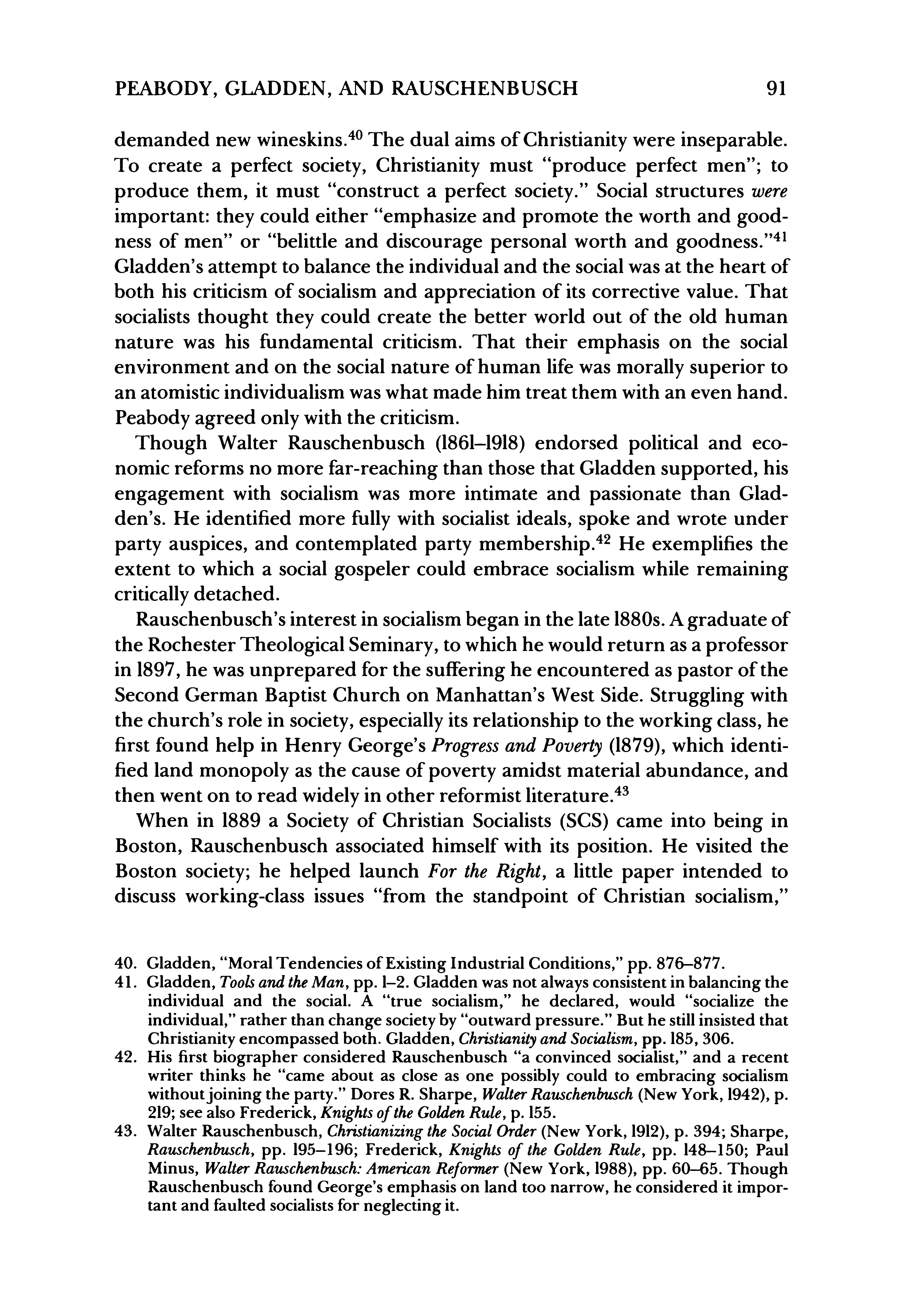 PEABODY, GLADDEN, AND RAUSCHENBUSCH
PEABODY, GLADDEN, AND RAUSCHENBUSCH
demanded new wineskins.40The dual aims of Christianitywere inseparable. To create a perfect society, Christianity must "produce perfect men"; to produce them, it must "construct a perfect society." Social structures were important: they could either "emphasizeand promote the worth and goodness of men" or "belittleand discourage personal worth and goodness."41 Gladden'sattempt tobalancethe individual and the socialwasatthe heartof both his criticismof socialism and appreciation of its corrective value. That socialiststhought they could create the better world out of the old human nature was his fundamental criticism. That their emphasis on the social environment and on the socialnature of human life wasmorallysuperior to anatomisticindividualismwaswhatmade him treatthem withaneven hand. Peabodyagreed only withthe criticism.
Though Walter Rauschenbusch (1861-1918)endorsed political and economic reforms no more far-reachingthan those thatGladden supported, his engagement with socialism was more intimate and passionate than Gladden's. He identified more fully with socialistideals, spoke and wrote under party auspices, and contemplated party membership.42He exemplifies the extent to which a social gospeler could embrace socialism while remaining criticallydetached.
Rauschenbusch'sinterestin socialismbegan in the late1880s.Agraduateof the RochesterTheological Seminary,towhichhe would return asaprofessor in 1897,he wasunprepared for the suffering he encountered aspastorof the Second German BaptistChurch on Manhattan'sWest Side. Struggling with the church'srole in society,especiallyitsrelationship to the workingclass,he first found help in Henry George's Progressand Poverty (1879), which identified land monopoly as the cause of poverty amidst materialabundance, and then went on to read widely in other reformistliterature.43
When in 1889 a Society of Christian Socialists (SCS) came into being in Boston, Rauschenbusch associated himself with its position. He visited the Boston society; he helped launch For theRight, a little paper intended to discuss working-class issues "from the standpoint of Christian socialism,"
40. Gladden, "MoralTendencies of Existing Industrial Conditions," pp. 876-877.
41. Gladden, ToolsandtheMan, pp. 1-2. Gladden was not always consistent in balancing the individual and the social. A "true socialism," he declared, would "socialize the individual," rather than change society by "outward pressure." But he stillinsisted that Christianity encompassed both. Gladden, ChristianityandSocialism,pp. 185,306.
42. His first biographer considered Rauschenbusch "a convinced socialist," and a recent writer thinks he "came about as close as one possibly could to embracing socialism without joining the party." Dores R. Sharpe, WalterRauschenbusch(New York, 1942), p. 219;see also Frederick, KnightsoftheGoldenRule, p. 155.
43. Walter Rauschenbusch, ChristianizingtheSocialOrder(New York, 1912),p. 394; Sharpe, Rauschenbusch,pp. 195-196; Frederick, Knightsof the GoldenRule, pp. 148-150; Paul Minus, WalterRauschenbusch:AmericanReformer(New York, 1988), pp. 60-65. Though Rauschenbusch found George's emphasis on land too narrow, he considered it important and faulted socialists for neglecting it.
91

CHURCH HISTORY
whichpublished the "Declarationof Principles"of a New Yorkaffiliateof the SCS;and he wroteforthe parent organization'sDawn.44
During a sabbaticalin Europe in 1891,in which he furthered his study of socialism,Rauschenbuschdiscovered the organizing theme for all his subsequent thinking: the centrality of the Kingdom of God in the teachings of Jesus. Upon hisreturn, he helped found the Brotherhood of the Kingdom, a group oflike-minded individualswho metannuallyto sharepapersand issue occasionalpublicationsfor the next twenty years. Given often to discussions of socialism, the brotherhood provided an important setting for him to develop his ideas about the meanings of Christianityand socialismfor each other-and about the placeof socialismin the coming Kingdomof God.45
The Christian socialism that Rauschenbusch embraced stood aloof not only from Marxiandoctrine, but alsofrom anysocialistparty.Whilethe New York society's declaration saw in socialism "an attempt to prefigure ... in economic forms"abadlyneeded "highersocialorder,"italsoremarkedthat, "asa body, we see no need now of committing ourselves to Socialismin the sense of anyspecificsystemofeconomic doctrine.... Weareconcerned with principles, not withmethods.... Weareevolutionists, not revolutionists.... In this sense we are Socialist,Socialistin the spirit rather than the letter."46 Rauschenbuschmoved closer to the socialistpoliticalmovement as the years went on, but throughout his life he voiced serious reservations, not unlike those expressed by Peabodyand Gladden, aboutitsaimsand methods.
He ordinarily placed these reservations in the context of more important convergences between Christianity and socialism. Thus in 1895 he found common ground in the principles of human worth and social cooperation. "Forworking purposes I am myselfa socialist,"he declared. "Wewantmore socialism than we have at present, anyway."47Yet socialism carried grave dangers: a loss of individual freedom; a tendency to weaken the familyand love of country; a proclivityto expect sudden change through force; and a "practicalmaterialism"that overemphasized "improved arrangements and facilities."LikePeabodyand Gladden, Rauschenbuschreserved hisstrongest language for the socialistthreat to freedom and over-reliance on structural
44. For the organization of the Boston and New York societies, see Dawn 1(15 May 1889): 3-4 and ibid. (Feb. 1890): 5. For Rauschenbusch's involvement see Sharpe, Rauschenbusch,p. 86; Minus, Rauschenbusch,p. 67; and Walter Rauschenbusch, "London Letter," Dawn 3 (July1891):9-11.Though W. D. P. Bliss, the SCS'sorganizer, spoke in Gladden's church and Gladden wrote for the Dawn, Gladden did not call himself a Christian Socialist. See "Mr. Bliss's Lecture Trip," Dawn 2 (June 1890): 93-94; Washington Gladden, "The Eight-Hour Problem," ibid. (July-Aug. 1890):137-147.
45. Minus, Rauschenbusch,chs. 5-6; Sharpe, Rauschenbusch,ch. 7; Charles Howard Hopkins, "Walter Rauschenbusch and the Brotherhood of the Kingdom," ChurchHistory7 (1938):138-156.
46. Sharpe, Rauschenbusch,pp. 91-92.
47. Walter Rauschenbusch, "The Ideals of Social Reformers," AmericanJournal of Sociology 2 (September 1896):203, 209, 211.
92
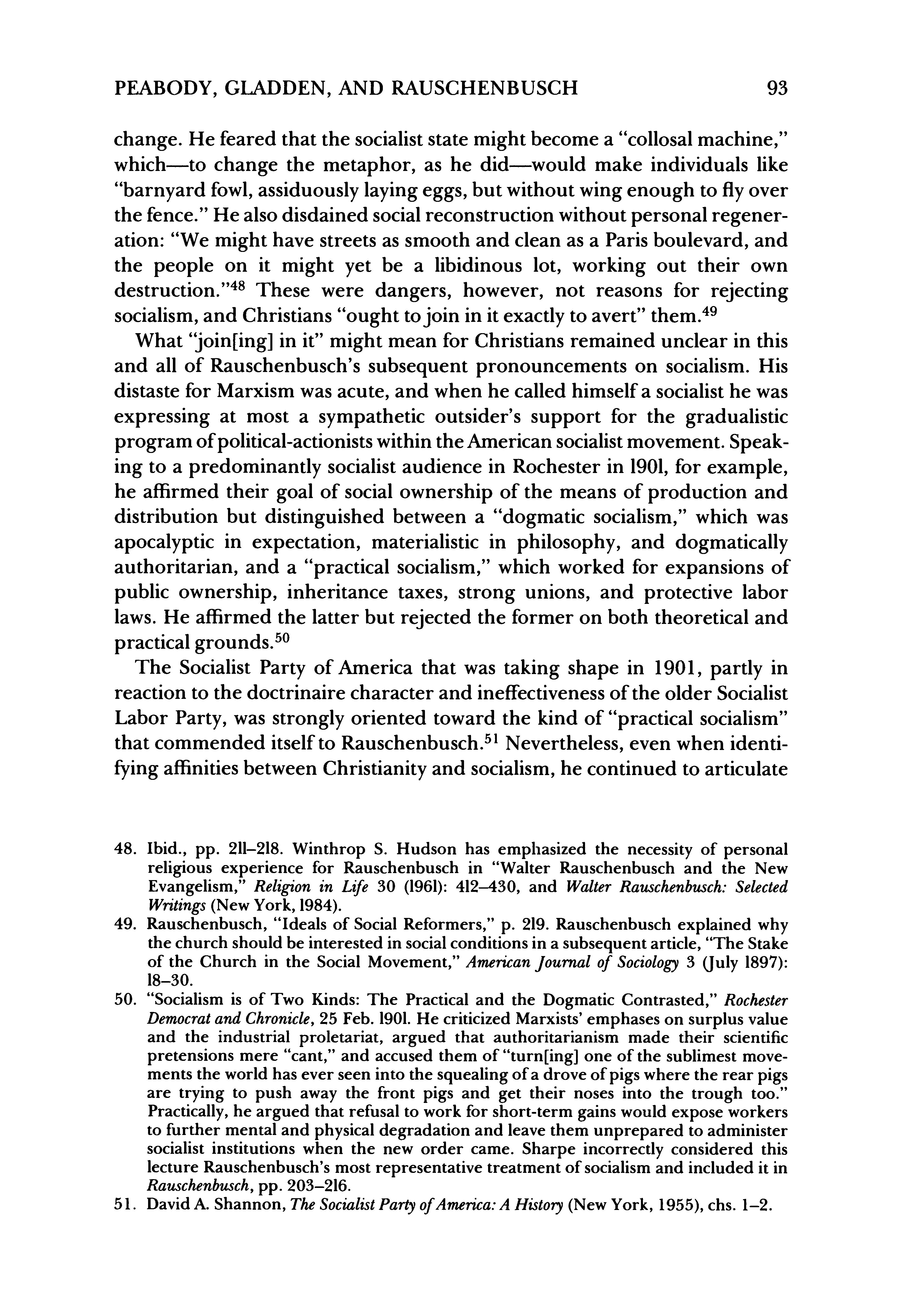 PEABODY, GLADDEN, AND RAUSCHENBUSCH
PEABODY, GLADDEN, AND RAUSCHENBUSCH
change. He feared that the socialiststatemight become a "collosalmachine," which-to change the metaphor, as he did-would make individuals like "barnyardfowl,assiduouslylayingeggs, but without wing enough to flyover the fence."He alsodisdained socialreconstructionwithoutpersonalregeneration: "Wemight have streets as smooth and clean as a Parisboulevard, and the people on it might yet be a libidinous lot, working out their own destruction."48These were dangers, however, not reasons for rejecting socialism,and Christians"oughttojoin in itexactlyto avert"them.49
What"join[ing]in it"might mean for Christiansremained unclear in this and all of Rauschenbusch's subsequent pronouncements on socialism. His distastefor Marxismwasacute, and when he called himself a socialisthe was expressing at most a sympathetic outsider's support for the gradualistic programofpolitical-actionistswithintheAmericansocialistmovement. Speaking to a predominantly socialistaudience in Rochester in 1901,for example, he affirmed their goal of social ownership of the means of production and distribution but distinguished between a "dogmatic socialism,"which was apocalyptic in expectation, materialistic in philosophy, and dogmatically authoritarian, and a "practicalsocialism,"which worked for expansions of public ownership, inheritance taxes, strong unions, and protective labor laws. He affirmed the latterbut rejected the former on both theoretical and practicalgrounds.50
The Socialist Party of America that was taking shape in 1901, partly in reactionto the doctrinairecharacterand ineffectivenessof the older Socialist Labor Party,was strongly oriented toward the kind of "practicalsocialism" thatcommended itself to Rauschenbusch.51Nevertheless, even when identifying affinitiesbetween Christianityand socialism,he continued to articulate
48. Ibid., pp. 211-218.Winthrop S. Hudson has emphasized the necessity of personal religious experience for Rauschenbusch in "Walter Rauschenbusch and the New Evangelism," Religion in Life 30 (1961):412-430, and WalterRauschenbusch:Selected Writings(New York, 1984).
49. Rauschenbusch, "Ideals of Social Reformers," p. 219. Rauschenbusch explained why the church should be interested in social conditions in a subsequent article, "The Stake of the Church in the Social Movement," AmericanJournal of Sociology3 (July 1897): 18-30.
50. "Socialism is of Two Kinds: The Practical and the Dogmatic Contrasted," Rochester Democratand Chronicle,25 Feb. 1901.He criticized Marxists' emphases on surplus value and the industrial proletariat, argued that authoritarianism made their scientific pretensions mere "cant," and accused them of "turn[ing] one of the sublimest movements the world has ever seen into the squealing of a drove of pigs where the rear pigs are trying to push away the front pigs and get their noses into the trough too." Practically, he argued that refusal to work for short-term gains would expose workers to further mental and physical degradation and leave them unprepared to administer socialist institutions when the new order came. Sharpe incorrectly considered this lecture Rauschenbusch's most representative treatment of socialism and included it in Rauschenbusch,pp. 203-216.
51. David A. Shannon, TheSocialistPartyofAmerica:AHistory(New York, 1955), chs. 1-2.
93
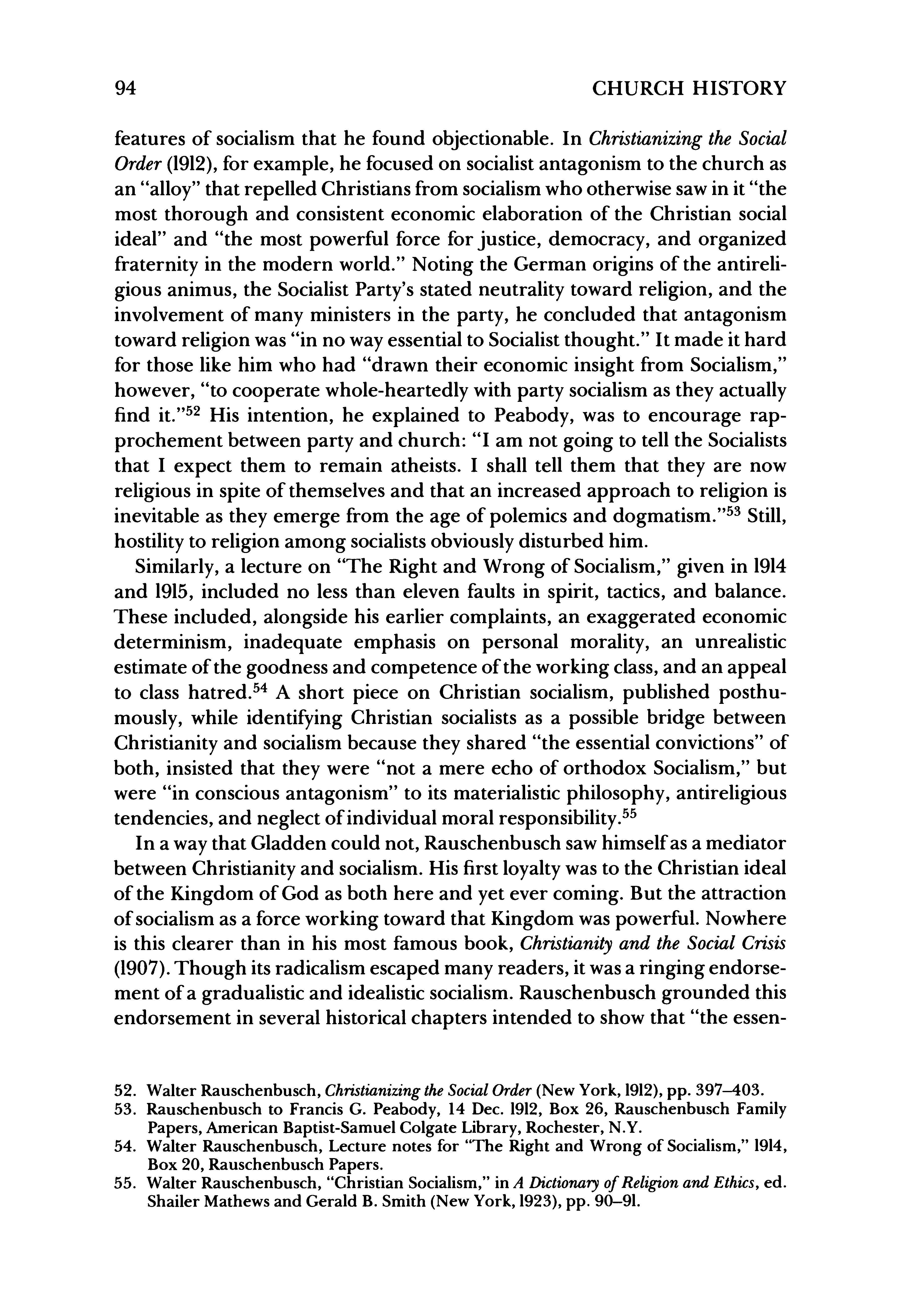
CHURCH HISTORY
features of socialism that he found objectionable. In ChristianizingtheSocial Order(1912),forexample, he focused on socialistantagonism to the church as an"alloy"thatrepelled Christiansfromsocialismwho otherwisesawinit"the most thorough and consistent economic elaboration of the Christian social ideal" and "the most powerful force forjustice, democracy, and organized fraternityin the modern world."Noting the German origins of the antireligious animus, the SocialistParty'sstated neutralitytoward religion, and the involvement of many ministers in the party, he concluded that antagonism towardreligion was"inno wayessentialto Socialistthought." It made ithard for those like him who had "drawntheir economic insight from Socialism," however, "tocooperate whole-heartedly withpartysocialismasthey actually find it."52His intention, he explained to Peabody, was to encourage rapprochement between partyand church: "Iam not going to tell the Socialists that I expect them to remain atheists. I shall tell them that they are now religious in spite of themselves and that an increased approach to religion is inevitable as they emerge from the age of polemics and dogmatism."53Still, hostilityto religion among socialistsobviouslydisturbedhim.
Similarly,a lecture on "The Right and Wrong of Socialism,"given in 1914 and 1915,included no less than eleven faults in spirit, tactics, and balance. These included, alongside his earlier complaints, an exaggerated economic determinism, inadequate emphasis on personal morality, an unrealistic estimateof the goodness and competence ofthe workingclass,and anappeal to class hatred.54A short piece on Christian socialism, published posthumously, while identifying Christian socialists as a possible bridge between Christianityand socialismbecause they shared "theessential convictions"of both, insisted that they were "not a mere echo of orthodox Socialism,"but were "inconscious antagonism"to its materialisticphilosophy, antireligious tendencies, and neglect ofindividual moralresponsibility.55
InawaythatGladdencould not, Rauschenbuschsawhimselfasamediator between Christianityand socialism.His firstloyaltywasto the Christianideal of the Kingdom of God asboth here and yet ever coming. But the attraction of socialismasaforceworking towardthat Kingdom waspowerful. Nowhere is this clearer than in his most famous book, ChristianityandtheSocialCrisis (1907).Though itsradicalismescaped manyreaders,itwasaringing endorsement of a gradualisticand idealisticsocialism.Rauschenbuschgrounded this endorsement in severalhistoricalchapters intended to show that "theessen-
52. Walter Rauschenbusch, ChristianizingtheSocialOrder(New York, 1912),pp. 397-403.
53. Rauschenbusch to Francis G. Peabody, 14 Dec. 1912,Box 26, Rauschenbusch Family Papers, American Baptist-Samuel Colgate Library, Rochester, N.Y.
54. Walter Rauschenbusch, Lecture notes for "The Right and Wrong of Socialism," 1914, Box 20, Rauschenbusch Papers.
55. Walter Rauschenbusch, "Christian Socialism," in A Dictionaryof Religionand Ethics,ed. Shailer Mathews and Gerald B. Smith (New York, 1923), pp. 90-91.
94

PEABODY,GLADDEN,AND RAUSCHENBUSCH
tialpurpose of Christianitywasto transformhuman societyinto the kingdom of God by regenerating all human relations and reconstituting them in accordance with the will of God."56Working through the prophets, Jesus, and the primitive church, he found a consistent call for a righteous society. The prophets' moralitywasnot individualistic;itwas"thepublic moralityon which national life is founded." Jesus appropriated their message when he announced thatthe KingdomofGodwasathand;he was"aHebrewprophet preparing men for the righteous social order." And the early Christian communities, organized for mutual help, exhibited "a strong leaven of democracy and protest."57Anticipating the "preferential option for the poor" of later liberation theology, Rauschenbusch stated that the prophets were"almostmonotonous"insidingwiththepoor andthatJesus'"fundamental sympathies ... were with the poor and oppressed."58Because conquest and captivityturned the prophetic tradition inward and Roman oppression andGentileculturesubsequentlydistortedtheChristianchurch'sunderstanding of Jesus' message of social transformation, the biblical record was not uniform;the ethical-socialimpulse thatwasitsgenius, however, wasclear.59
Rauschenbuschagreed with PeabodythatJesus wasnot "asocialreformer of the modern type"and insisted thathe approached the problemsof his day from a moraland religious point of view.60Whereas Peabody'sJesus did not apply categories of wealth or poverty to individuals, however, Rauschenbusch'sJesus taught that riches were obstaclesto the "revolutionary"Kingdom standardsofjustice, equality,and love.Asforthe earlychurch, Peabody had found no widespread, compulsory, or successfulcommon ownership of goods, and Rauschenbuschagreed to a point. "Generosity,"not compulsion, had characterized early Christiancommunities. Rauschenbusch concluded, however, that economic mutuality had been fairly widespread, successful, and long-lasting.61 He believed no more than Peabody that first-century practices could be applied to modern industrial conditions; he did believe thatJesus' message yielded normative principles for the structure of society and the relationshipsamong socialgroups.62
When Rauschenbusch moved from the biblical record to "the present
56. Walter Rauschenbusch, ChristianityandtheSocialCrisis(New York, 1907), p. xiii.
57. Ibid., pp. 8, 54-55, 67,133.
58. Ibid., pp. 12-13,82.
59. Ibid., pp. 27-31, 98-112,152-160.
60. Ibid., pp. 47-48.
61. Ibid., pp. 81,77,120-133.
62. One historian considers Rauschenbusch's approach to the Bible inconsistent. More intent to find sanction for social activism than to apply the hermeneutical principles of liberal biblical scholarship consistently, he interpreted passages that fostered social passivity as "in history" and passages that undergirded activism as "absolute, timeless, infallible authority." Glenn C. Altschuler, "Walter Rauschenbusch: Theology, the Church, and the Social Gospel," Foundations22 (1979):140-151.
95
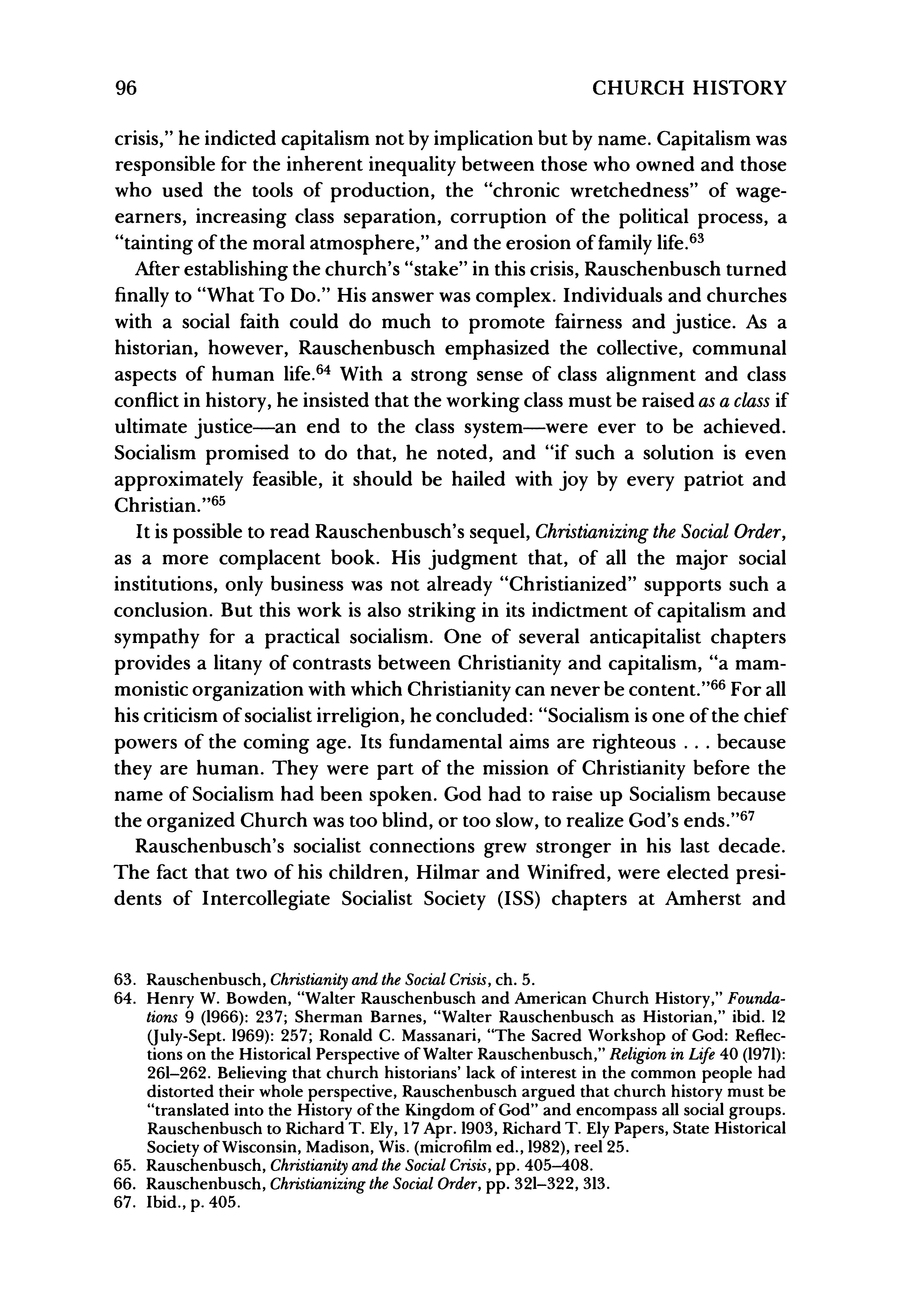
CHURCH HISTORY
crisis,"he indicted capitalismnot byimplicationbutbyname. Capitalismwas responsible for the inherent inequalitybetween those who owned and those who used the tools of production, the "chronic wretchedness" of wageearners, increasing class separation, corruption of the political process, a "taintingof the moralatmosphere,"and the erosion offamilylife.63
Afterestablishingthe church's"stake"in thiscrisis,Rauschenbuschturned finallyto "WhatTo Do." His answerwascomplex. Individualsand churches with a social faith could do much to promote fairness and justice. As a historian, however, Rauschenbusch emphasized the collective, communal aspects of human life.64With a strong sense of class alignment and class conflictin history,he insistedthatthe workingclassmustbe raisedasaclassif ultimate justice-an end to the class system-were ever to be achieved. Socialism promised to do that, he noted, and "if such a solution is even approximately feasible, it should be hailed with joy by every patriot and Christian."65
Itispossibleto read Rauschenbusch'ssequel, ChristianizingtheSocialOrder, as a more complacent book. His judgment that, of all the major social institutions, only business was not already "Christianized"supports such a conclusion. But this work is also strikingin its indictment of capitalismand sympathy for a practical socialism. One of several anticapitalist chapters provides a litany of contrastsbetween Christianityand capitalism,"amammonisticorganizationwithwhichChristianitycanneverbecontent."66Forall hiscriticismof socialistirreligion, he concluded: "Socialismisone of the chief powers of the coming age. Its fundamental aims are righteous . . . because they are human. They were part of the mission of Christianitybefore the name of Socialismhad been spoken. God had to raise up Socialismbecause the organized Churchwastoo blind, or too slow,to realizeGod'sends."67
Rauschenbusch's socialist connections grew stronger in his last decade. The fact that two of his children, Hilmar and Winifred, were elected presidents of Intercollegiate Socialist Society (ISS) chapters at Amherst and
63. Rauschenbusch, ChristianityandtheSocialCrisis,ch. 5.
64. Henry W. Bowden, "Walter Rauschenbusch and American Church History," Foundations 9 (1966): 237; Sherman Barnes, "Walter Rauschenbusch as Historian," ibid. 12 (July-Sept. 1969): 257; Ronald C. Massanari, "The Sacred Workshop of God: Reflections on the Historical Perspective of Walter Rauschenbusch," Religionin Life40 (1971): 261-262. Believing that church historians' lack of interest in the common people had distorted their whole perspective, Rauschenbusch argued that church history must be "translated into the History of the Kingdom of God" and encompass all social groups. Rauschenbusch to Richard T. Ely, 17Apr. 1903,Richard T. Ely Papers, State Historical Society of Wisconsin, Madison, Wis. (microfilm ed., 1982),reel 25.
65. Rauschenbusch, ChristianityandtheSocialCrisis,pp. 405-408.
66. Rauschenbusch, ChristianizingtheSocialOrder,pp. 321-322, 313. 67. Ibid., p. 405.
96
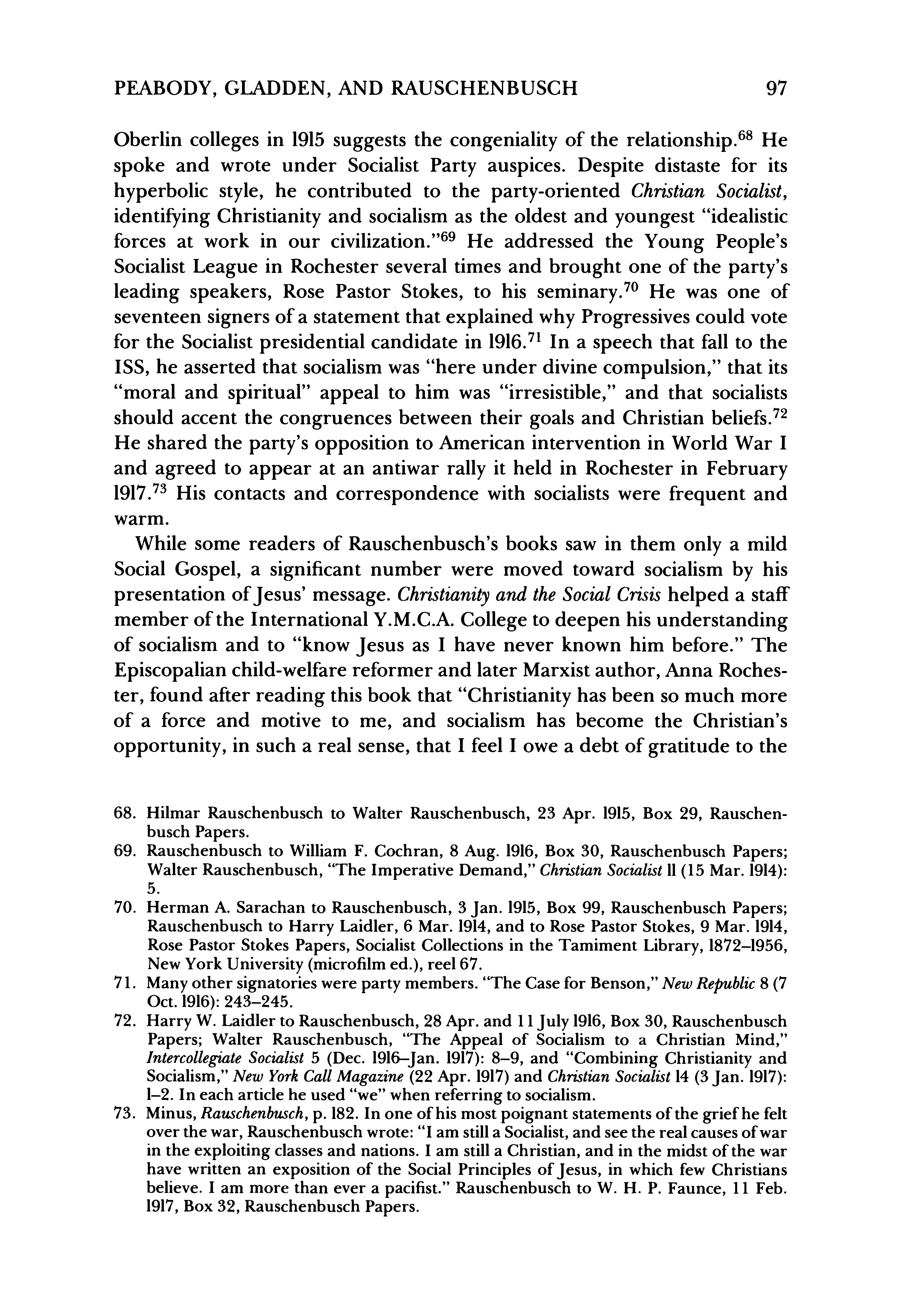
Oberlin colleges in 1915suggests the congeniality of the relationship.68He spoke and wrote under Socialist Party auspices. Despite distaste for its hyperbolic style, he contributed to the party-oriented ChristianSocialist, identifying Christianityand socialism as the oldest and youngest "idealistic forces at work in our civilization."69He addressed the Young People's SocialistLeague in Rochester several times and brought one of the party's leading speakers, Rose Pastor Stokes, to his seminary.70He was one of seventeen signers of a statement that explained why Progressivescould vote for the Socialistpresidential candidate in 1916.71In a speech that fall to the ISS, he asserted that socialismwas "here under divine compulsion," that its "moral and spiritual" appeal to him was "irresistible,"and that socialists should accent the congruences between their goals and Christian beliefs.72 He shared the party'sopposition to American intervention in World War I and agreed to appear at an antiwar rally it held in Rochester in February 1917.73His contacts and correspondence with socialists were frequent and warm.
While some readers of Rauschenbusch's books saw in them only a mild Social Gospel, a significant number were moved toward socialism by his presentation ofJesus' message. ChristianityandtheSocialCrisishelped a staff member of the International Y.M.C.A.College to deepen his understanding of socialism and to "knowJesus as I have never known him before." The Episcopalianchild-welfarereformer and laterMarxistauthor, Anna Rochester, found afterreading this book that "Christianityhas been so much more of a force and motive to me, and socialism has become the Christian's opportunity, in such a real sense, that I feel I owe a debt of gratitude to the
68. Hilmar Rauschenbusch to Walter Rauschenbusch, 23 Apr. 1915,Box 29, Rauschenbusch Papers.
69. Rauschenbusch to William F. Cochran, 8 Aug. 1916,Box 30, Rauschenbusch Papers; Walter Rauschenbusch, "The Imperative Demand," ChristianSocialist11(15 Mar. 1914): 5.
70. Herman A. Sarachan to Rauschenbusch, 3 Jan. 1915,Box 99, Rauschenbusch Papers; Rauschenbusch to Harry Laidler, 6 Mar. 1914,and to Rose Pastor Stokes, 9 Mar. 1914, Rose Pastor Stokes Papers, Socialist Collections in the Tamiment Library, 1872-1956, New York University (microfilm ed.), reel 67.
71. Many other signatories were party members. "The Case for Benson," NewRepublic8 (7 Oct. 1916):243-245.
72. Harry W. Laidler to Rauschenbusch, 28 Apr. and 11July 1916,Box 30, Rauschenbusch Papers; Walter Rauschenbusch, "The Appeal of Socialism to a Christian Mind," IntercollegiateSocialist5 (Dec. 1916-Jan. 1917):8-9, and "Combining Christianity and Socialism," New YorkCallMagazine (22 Apr. 1917)and ChristianSocialist14(3Jan. 1917): 1-2. In each article he used "we"when referring to socialism.
73. Minus, Rauschenbusch,p. 182.In one of his most poignant statements of the grief he felt over the war, Rauschenbusch wrote: "Iam stilla Socialist, and see the real causes of war in the exploiting classes and nations. I am still a Christian, and in the midst of the war have written an exposition of the Social Principles of Jesus, in which few Christians believe. I am more than ever a pacifist." Rauschenbusch to W. H. P. Faunce, 11 Feb. 1917,Box 32, Rauschenbusch Papers.
PEABODY,GLADDEN,AND RAUSCHENBUSCH
97
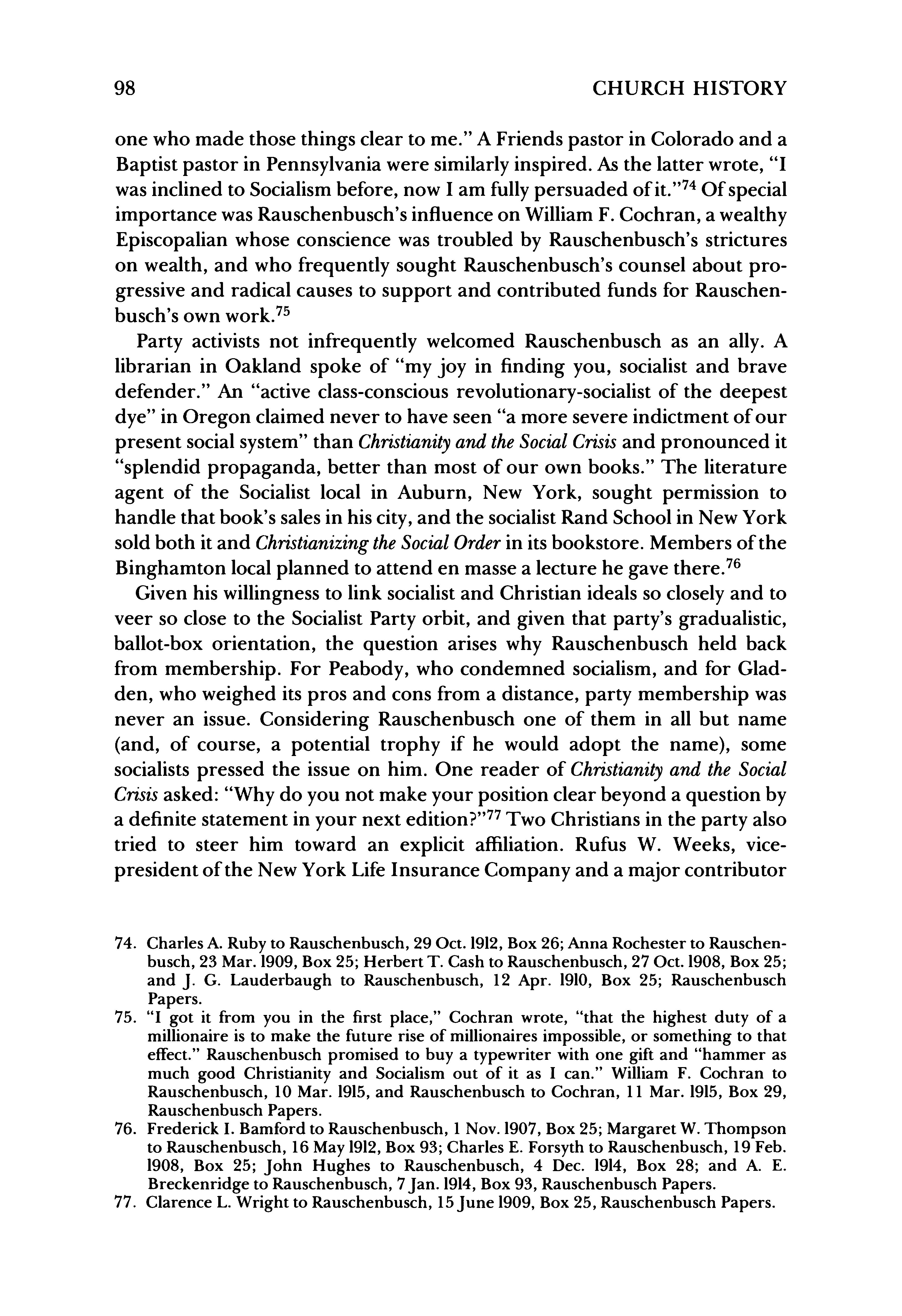
CHURCH HISTORY
one who made those things clearto me."A Friendspastorin Colorado and a Baptistpastorin Pennsylvaniawere similarlyinspired.Asthe latterwrote, "I wasinclined to Socialismbefore, now I am fullypersuaded of it."74Ofspecial importancewasRauschenbusch'sinfluence on WilliamF.Cochran,awealthy Episcopalian whose conscience was troubled by Rauschenbusch'sstrictures on wealth, and who frequently sought Rauschenbusch'scounsel about progressive and radicalcauses to support and contributed funds for Rauschenbusch'sown work.75
Party activists not infrequently welcomed Rauschenbusch as an ally. A librarian in Oakland spoke of "myjoy in finding you, socialist and brave defender." An "activeclass-conscious revolutionary-socialistof the deepest dye"in Oregon claimed never to have seen "amore severe indictment of our present socialsystem"than ChristianityandtheSocialCrisisand pronounced it "splendid propaganda, better than most of our own books."The literature agent of the Socialist local in Auburn, New York, sought permission to handle thatbook'ssalesin hiscity,and the socialistRandSchoolin New York soldboth itand ChristianizingtheSocialOrderin itsbookstore. Membersof the Binghamton localplanned to attend en massealecture he gave there.76
Given his willingness to link socialistand Christianideals so closely and to veer so close to the SocialistPartyorbit, and given that party'sgradualistic, ballot-box orientation, the question arises why Rauschenbusch held back from membership. For Peabody, who condemned socialism, and for Gladden, who weighed its pros and cons from a distance, party membership was never an issue. Considering Rauschenbusch one of them in all but name (and, of course, a potential trophy if he would adopt the name), some socialistspressed the issue on him. One reader of Christianityand theSocial Crisisasked:"Whydo you not makeyour position clearbeyond a question by a definite statement in your next edition?"77Two Christiansin the partyalso tried to steer him toward an explicit affiliation. Rufus W. Weeks, vicepresident of the New YorkLifeInsuranceCompanyand amajorcontributor
74. Charles A. Ruby to Rauschenbusch, 29 Oct. 1912,Box 26; Anna Rochester to Rauschenbusch, 23 Mar. 1909, Box 25; Herbert T. Cash to Rauschenbusch, 27 Oct. 1908, Box 25; and J. G. Lauderbaugh to Rauschenbusch, 12 Apr. 1910, Box 25; Rauschenbusch Papers.
75. "I got it from you in the first place," Cochran wrote, "that the highest duty of a millionaire is to make the future rise of millionaires impossible, or something to that effect." Rauschenbusch promised to buy a typewriter with one gift and "hammer as much good Christianity and Socialism out of it as I can." William F. Cochran to Rauschenbusch, 10 Mar. 1915,and Rauschenbusch to Cochran, 11 Mar. 1915,Box 29, Rauschenbusch Papers.
76. Frederick I. Bamford to Rauschenbusch, 1Nov. 1907, Box 25; Margaret W.Thompson to Rauschenbusch, 16 May 1912,Box 93; Charles E. Forsyth to Rauschenbusch, 19 Feb. 1908, Box 25; John Hughes to Rauschenbusch, 4 Dec. 1914, Box 28; and A. E. Breckenridge to Rauschenbusch, 7Jan. 1914,Box 93, Rauschenbusch Papers.
77. Clarence L. Wright to Rauschenbusch, 15June 1909, Box 25, Rauschenbusch Papers.
98
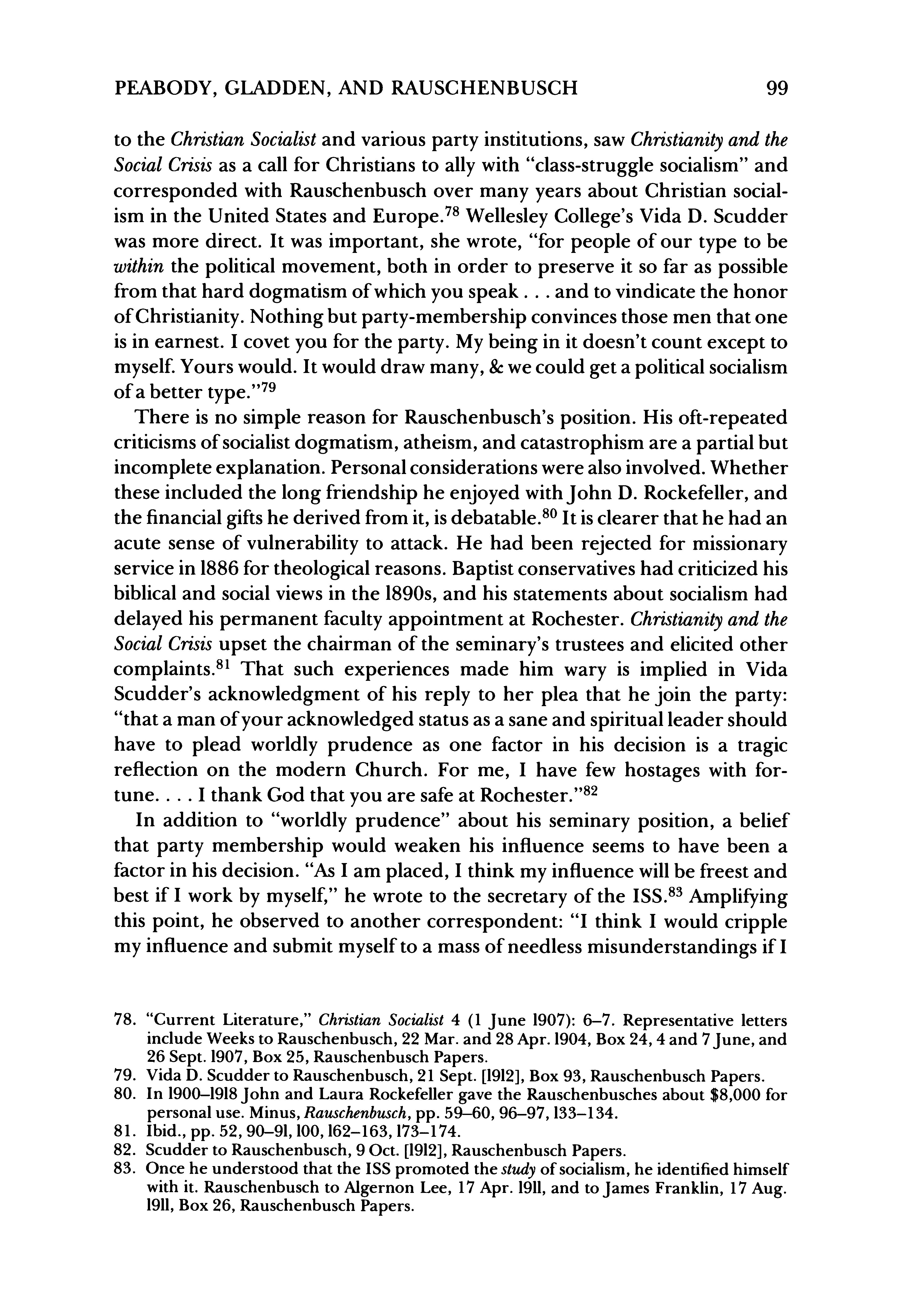
to the ChristianSocialistand various partyinstitutions, sawChristianityandthe SocialCrisisas a call for Christiansto allywith "class-strugglesocialism"and corresponded with Rauschenbusch over many years about Christiansocialism in the United Statesand Europe.78Wellesley College's Vida D. Scudder was more direct. It was important, she wrote, "forpeople of our type to be withinthe political movement, both in order to preserve it so far as possible fromthathard dogmatism of whichyou speak . . .and tovindicatethe honor ofChristianity.Nothing butparty-membershipconvincesthose men thatone isin earnest. I covet you for the party.Mybeing in it doesn't count except to myself.Yourswould. Itwould drawmany,&wecould get apoliticalsocialism ofabetter type."79
There is no simple reason for Rauschenbusch'sposition. His oft-repeated criticismsof socialistdogmatism, atheism,and catastrophismareapartialbut incomplete explanation. Personalconsiderationswerealsoinvolved.Whether these included the long friendship he enjoyed withJohn D. Rockefeller,and the financialgiftshe derived fromit,isdebatable.80Itisclearerthathe had an acute sense of vulnerability to attack. He had been rejected for missionary servicein 1886fortheological reasons. Baptistconservativeshadcriticizedhis biblicaland socialviewsin the 1890s,and his statements about socialismhad delayed his permanent facultyappointment at Rochester. Christianityandthe SocialCrisisupset the chairman of the seminary'strustees and elicited other complaints.81That such experiences made him wary is implied in Vida Scudder's acknowledgment of his reply to her plea that he join the party: "thatamanofyouracknowledged statusasasaneand spiritualleader should have to plead worldly prudence as one factor in his decision is a tragic reflection on the modern Church. For me, I have few hostages with fortune.... I thankGod thatyou are safeatRochester."82
In addition to "worldlyprudence" about his seminary position, a belief that party membership would weaken his influence seems to have been a factorin his decision. "AsI am placed, I think myinfluence willbe freestand best if I work by myself,"he wrote to the secretaryof the ISS.83Amplifying this point, he observed to another correspondent: "I think I would cripple my influence and submitmyselfto a massof needless misunderstandings if I
78. "Current Literature," ChristianSocialist4 (1 June 1907): 6-7. Representative letters include Weeks to Rauschenbusch, 22 Mar.and 28 Apr. 1904, Box 24, 4 and 7June, and 26 Sept. 1907, Box 25, Rauschenbusch Papers.
79. Vida D. Scudder to Rauschenbusch, 21 Sept. [1912],Box 93, Rauschenbusch Papers.
80. In 1900-1918John and Laura Rockefeller gave the Rauschenbusches about $8,000 for personal use. Minus, Rauschenbusch,pp. 59-60, 96-97,133-134.
81. Ibid., pp. 52, 90-91,100,162-163,173-174.
82. Scudder to Rauschenbusch, 9 Oct. [1912],Rauschenbusch Papers.
83. Once he understood that the ISS promoted the studyof socialism, he identified himself with it. Rauschenbusch to Algernon Lee, 17 Apr. 1911,and to James Franklin, 17 Aug. 1911,Box 26, Rauschenbusch Papers.
PEABODY,GLADDEN,AND RAUSCHENBUSCH
99
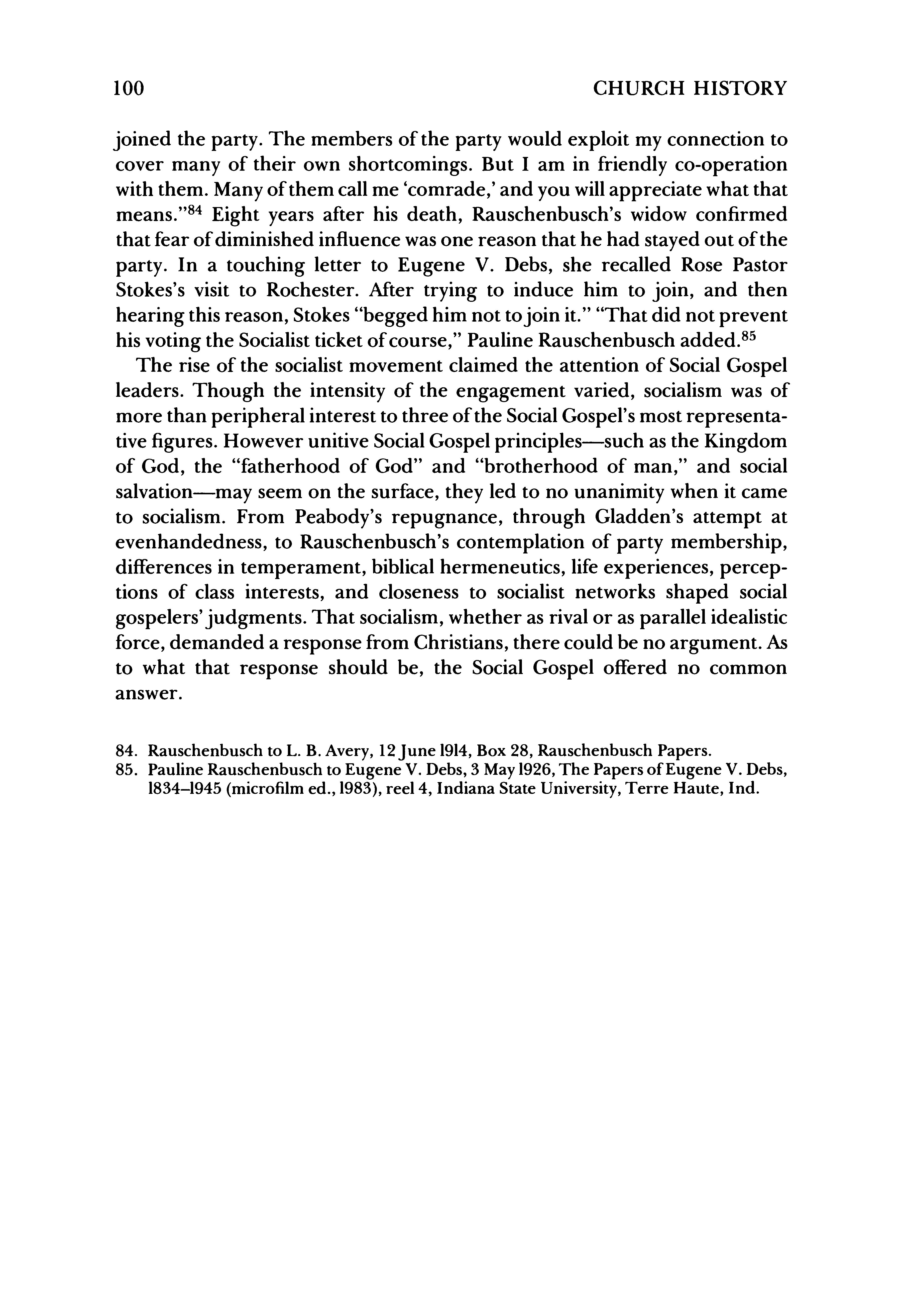
joined the party.The members of the partywould exploit my connection to cover many of their own shortcomings. But I am in friendly co-operation withthem. Manyofthem callme 'comrade,'andyou willappreciatewhatthat means."84Eight years after his death, Rauschenbusch's widow confirmed thatfearof diminished influence wasone reason thathe hadstayedout ofthe party. In a touching letter to Eugene V. Debs, she recalled Rose Pastor Stokes's visit to Rochester. After trying to induce him to join, and then hearing thisreason, Stokes"beggedhim not tojoin it.""Thatdid not prevent hisvoting the Socialistticketofcourse,"PaulineRauschenbuschadded.85
The rise of the socialistmovement claimed the attention of SocialGospel leaders. Though the intensity of the engagement varied, socialism was of more thanperipheral interesttothree ofthe SocialGospel'smostrepresentativefigures. However unitiveSocialGospelprinciples-such asthe Kingdom of God, the "fatherhood of God" and "brotherhood of man," and social salvation-may seem on the surface,they led to no unanimity when it came to socialism. From Peabody's repugnance, through Gladden's attempt at evenhandedness, to Rauschenbusch'scontemplation of party membership, differences in temperament, biblicalhermeneutics, life experiences, perceptions of class interests, and closeness to socialist networks shaped social gospelers'judgments. That socialism,whether asrivalor asparallelidealistic force,demanded aresponse fromChristians,there could be no argument.As to what that response should be, the Social Gospel offered no common answer.
84. Rauschenbusch to L. B. Avery, 12June 1914,Box 28, Rauschenbusch Papers.
85. Pauline Rauschenbusch to Eugene V. Debs, 3 May1926,The Papers of Eugene V. Debs, 1834-1945 (microfilm ed., 1983),reel 4, Indiana State University, Terre Haute, Ind.
CHURCH HISTORY
100

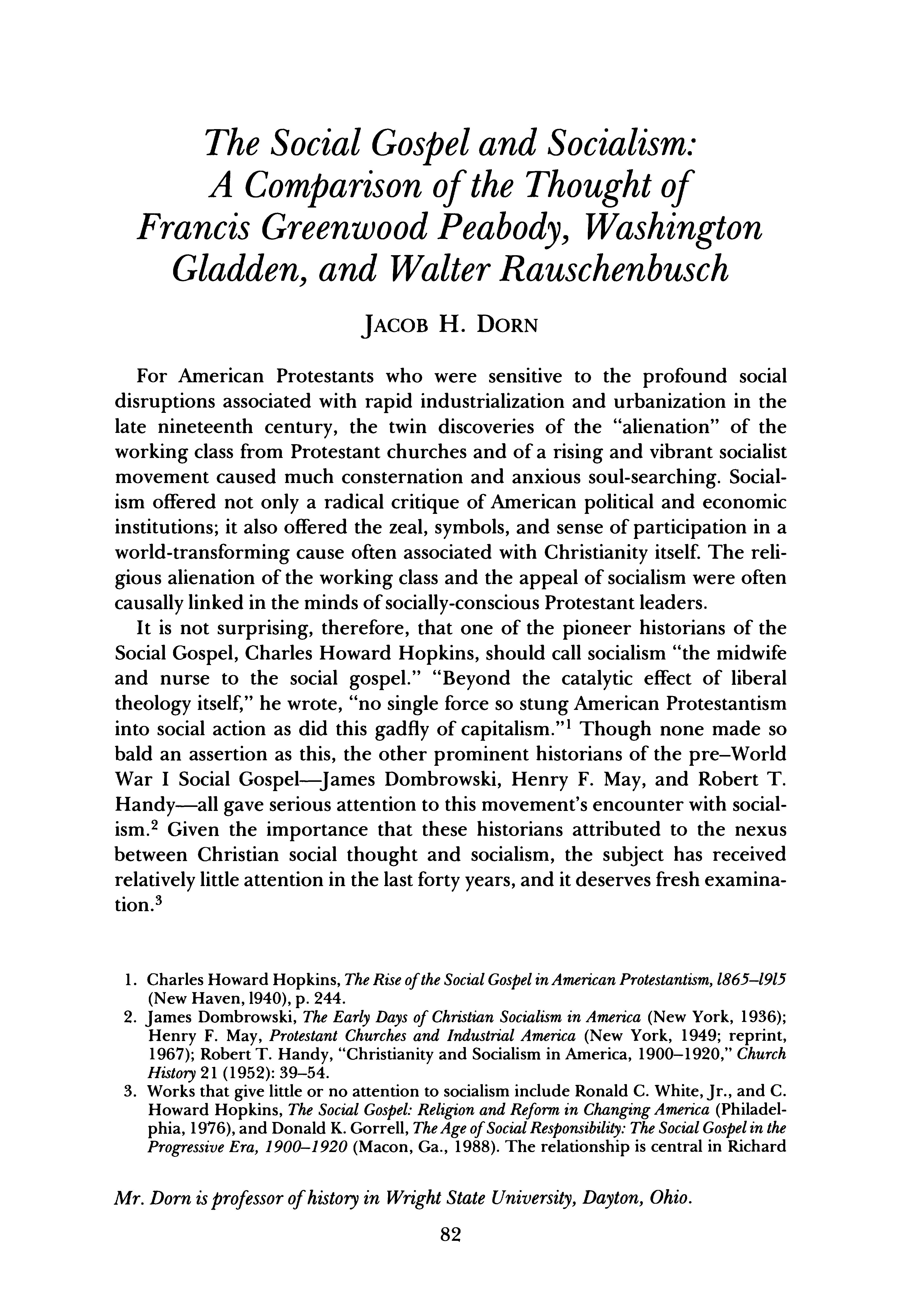

 PEABODY, GLADDEN, AND RAUSCHENBUSCH
PEABODY, GLADDEN, AND RAUSCHENBUSCH







 PEABODY, GLADDEN, AND RAUSCHENBUSCH
PEABODY, GLADDEN, AND RAUSCHENBUSCH

 PEABODY, GLADDEN, AND RAUSCHENBUSCH
PEABODY, GLADDEN, AND RAUSCHENBUSCH






